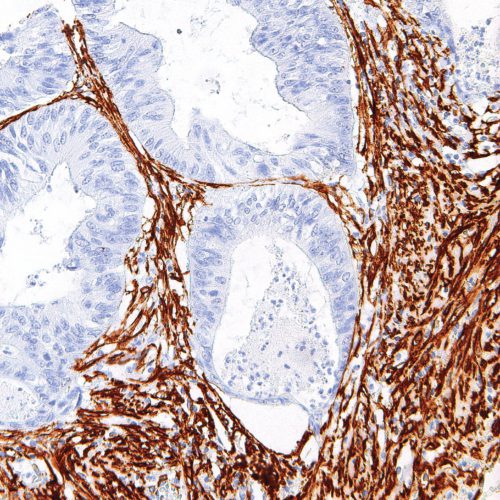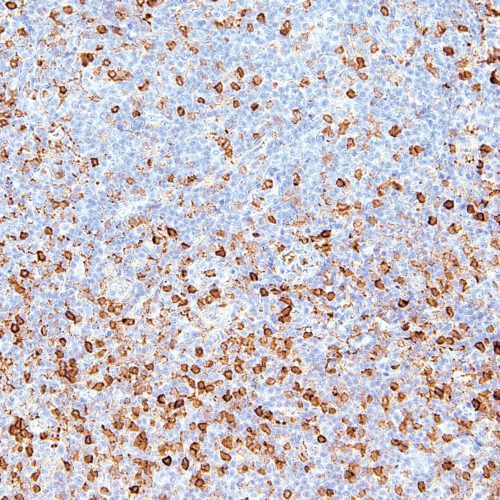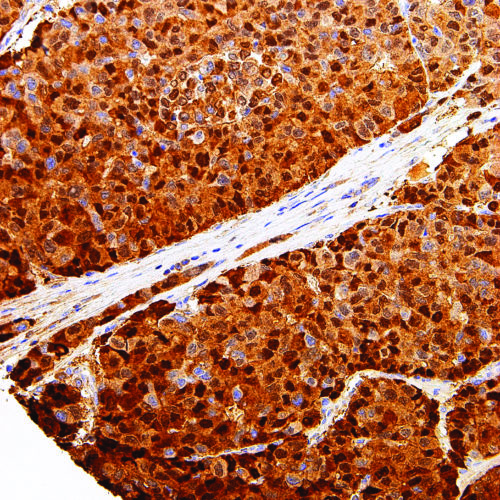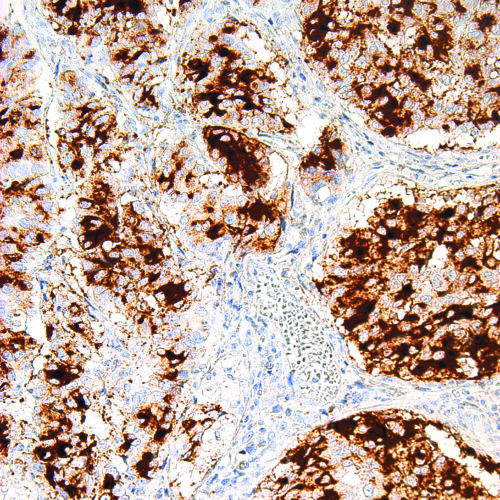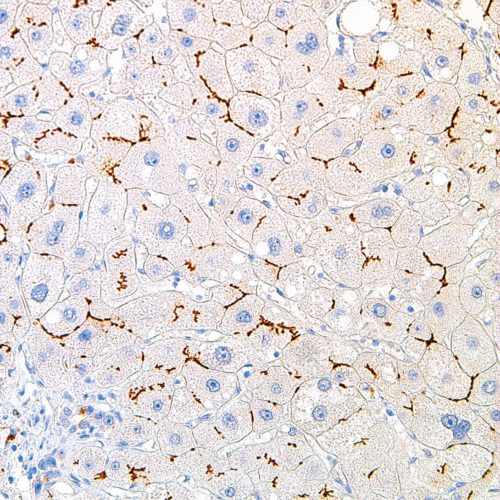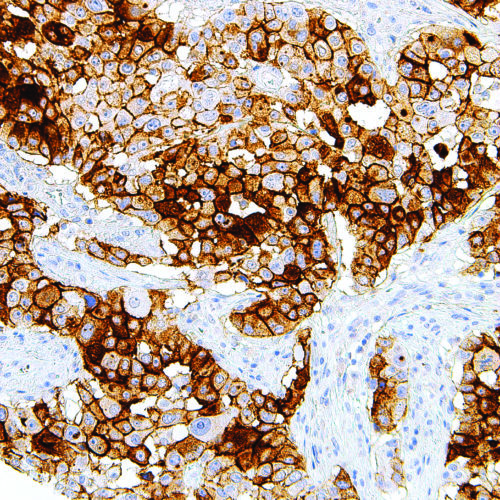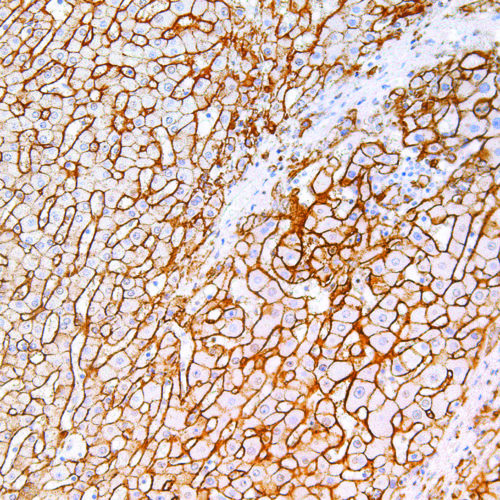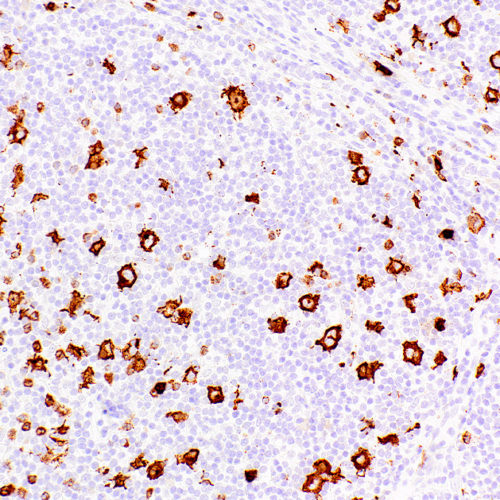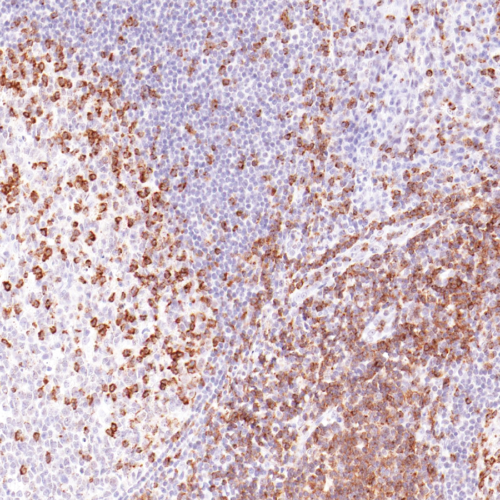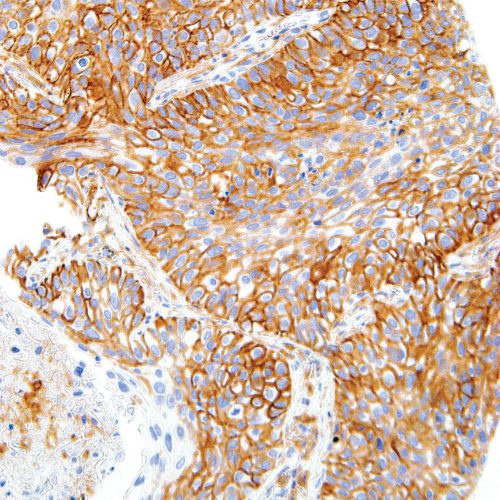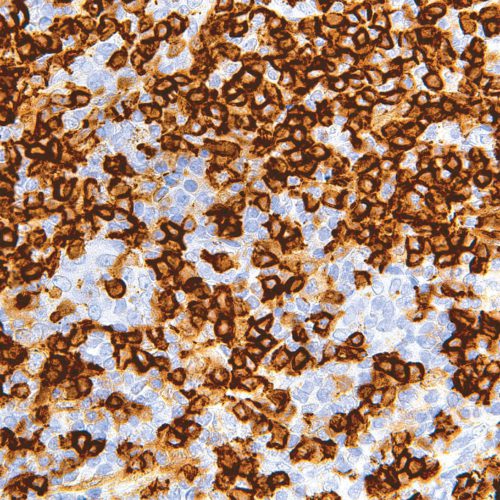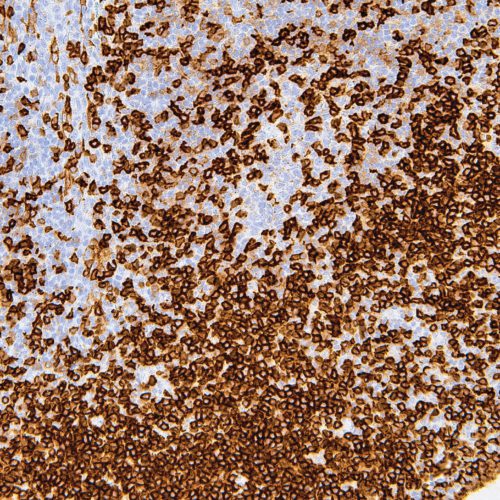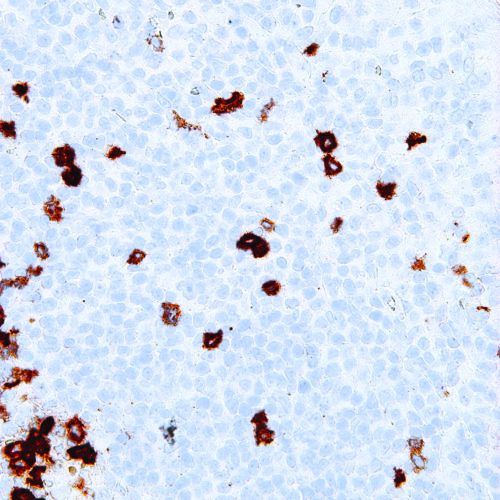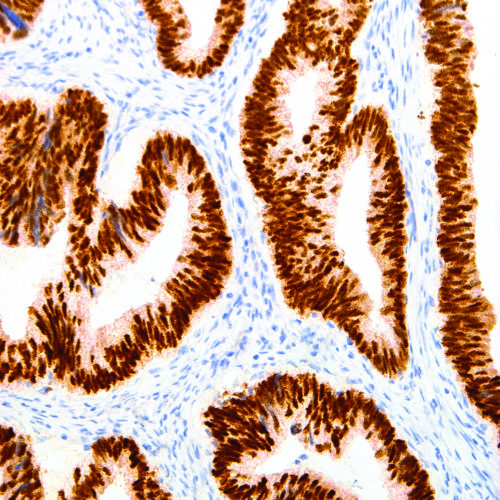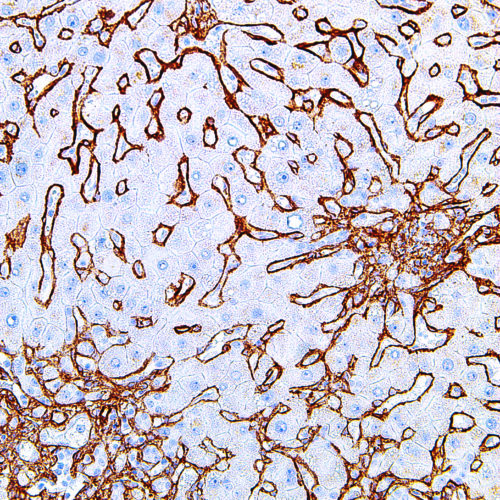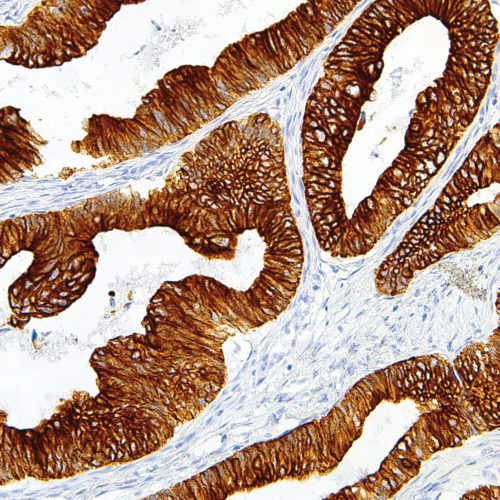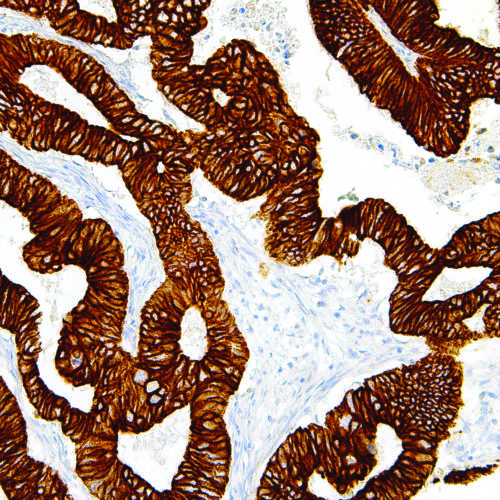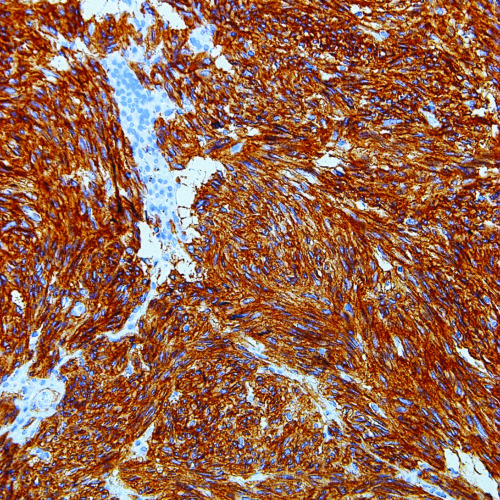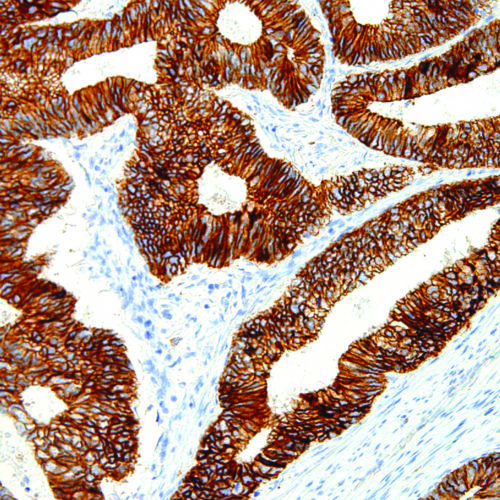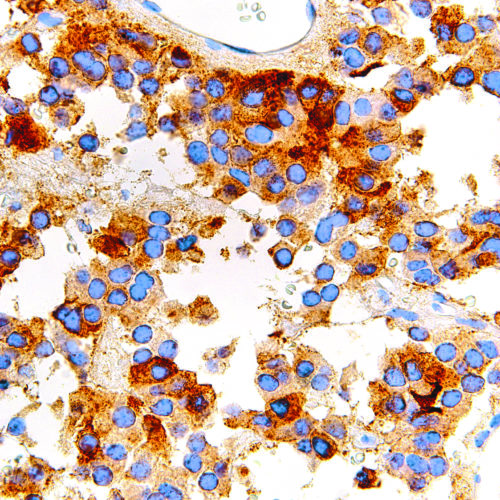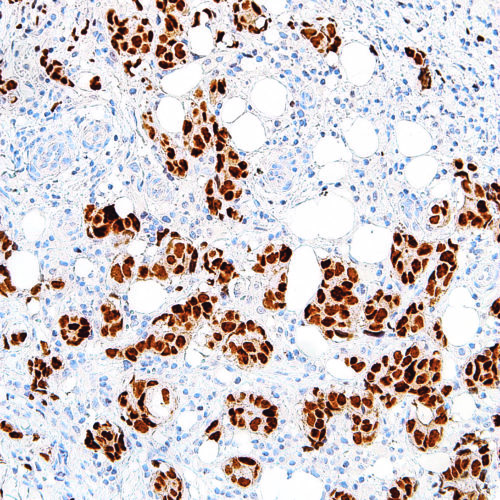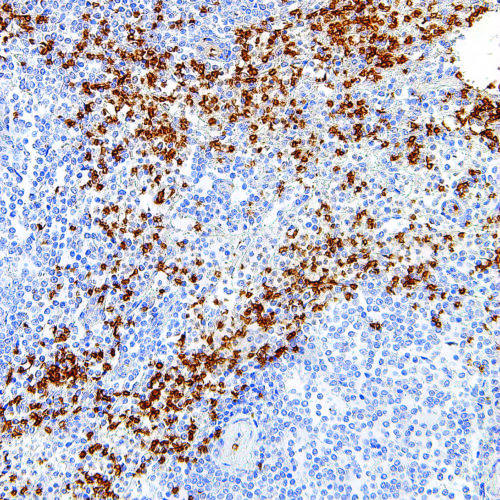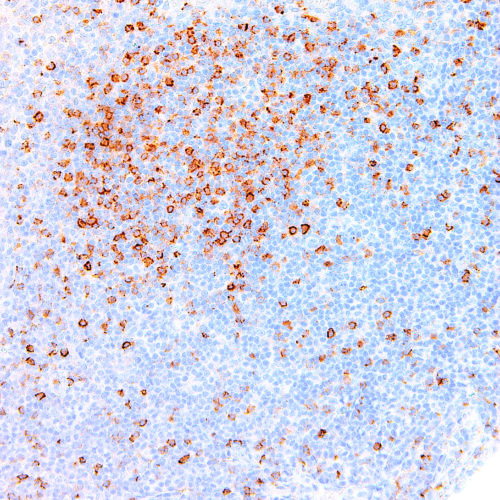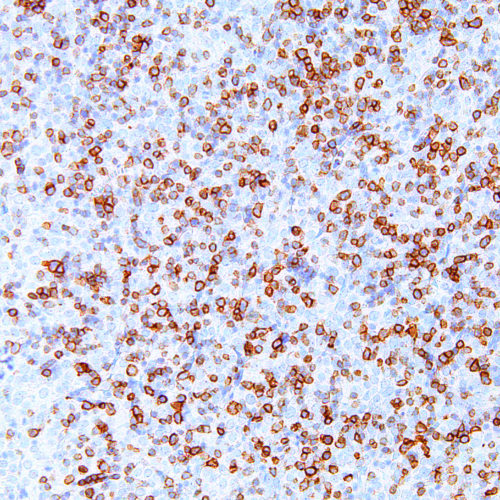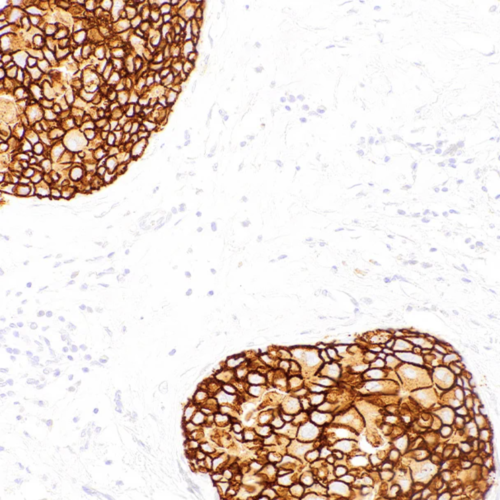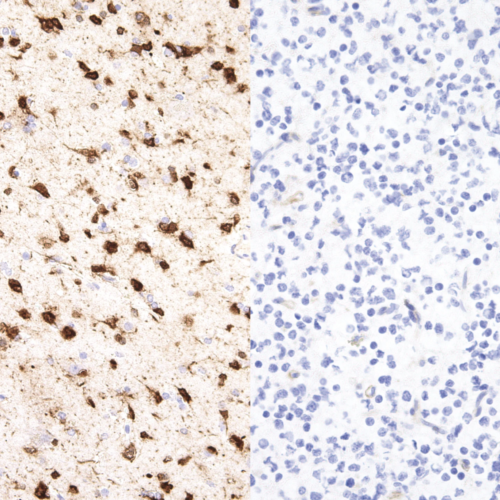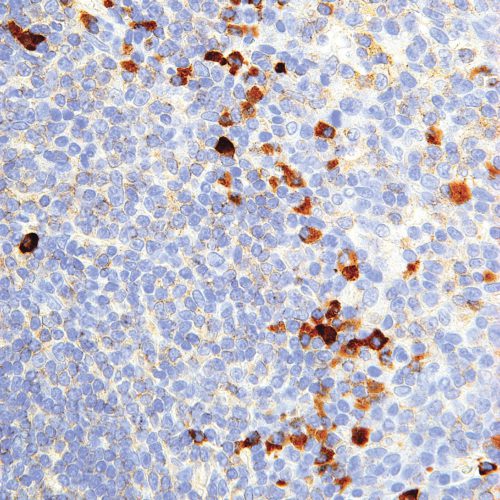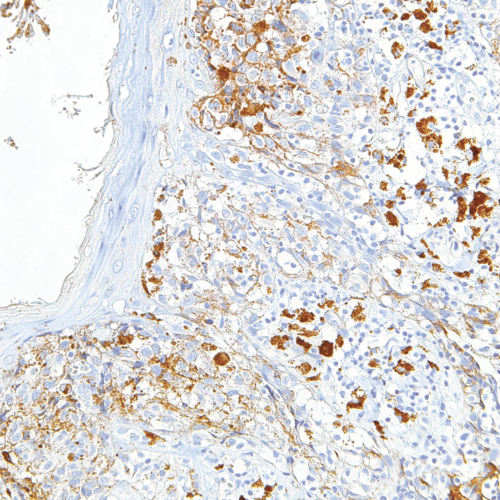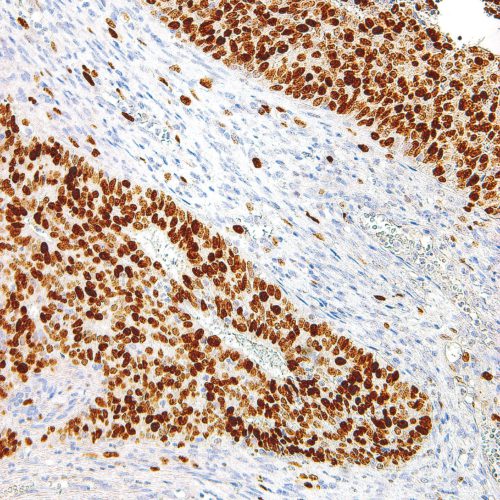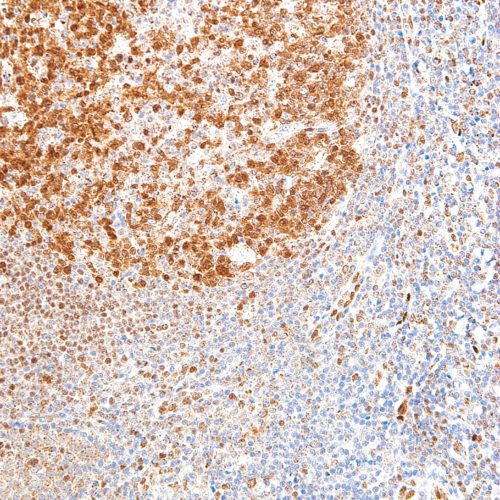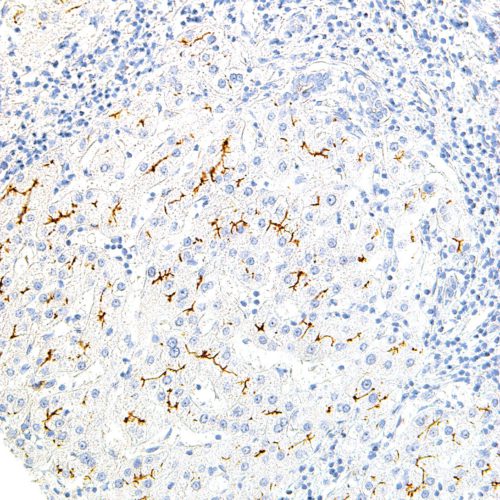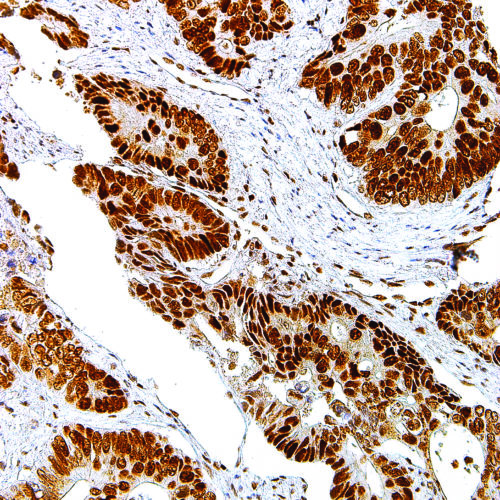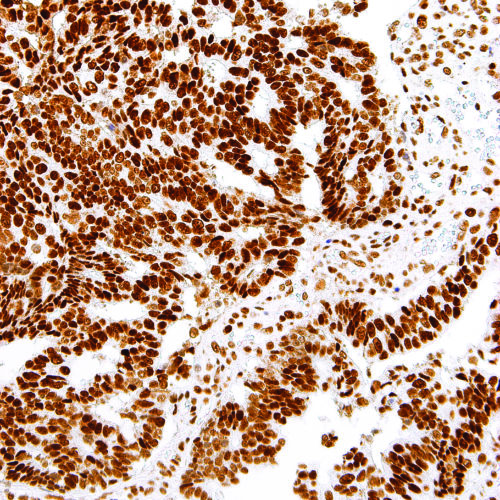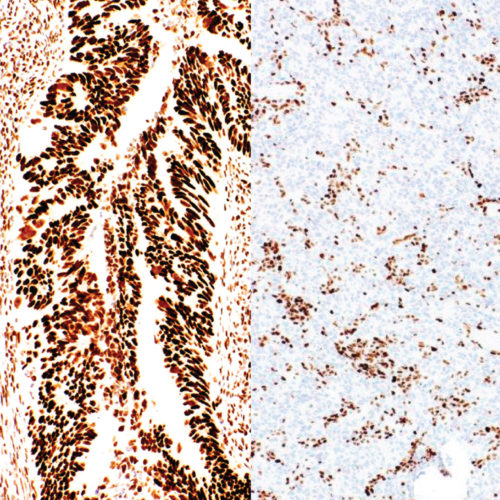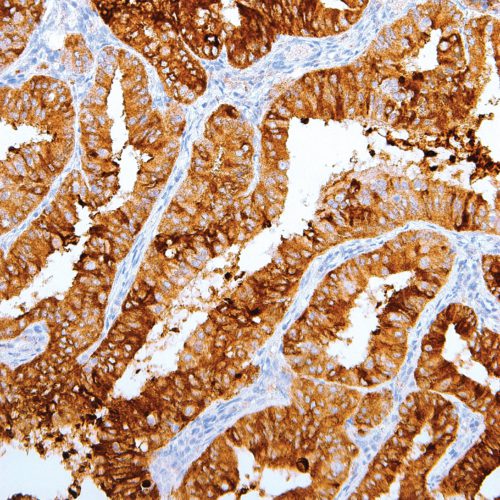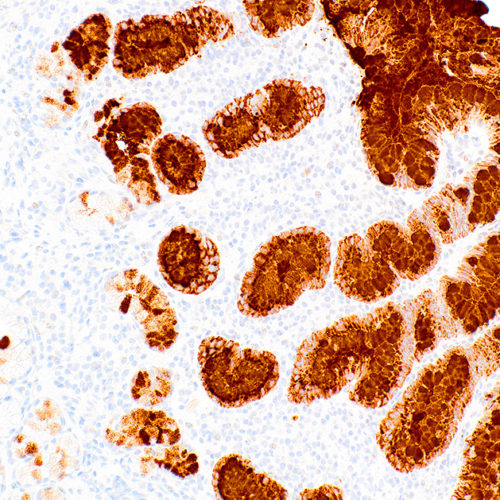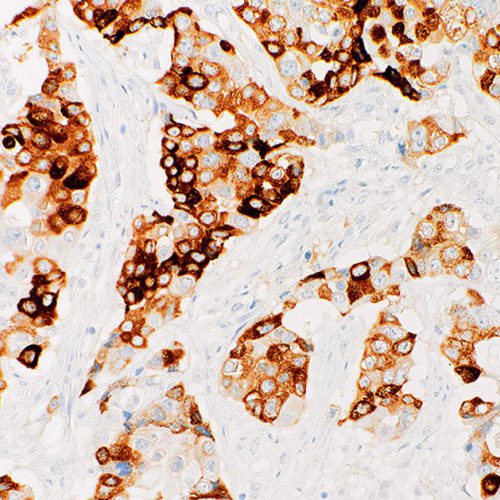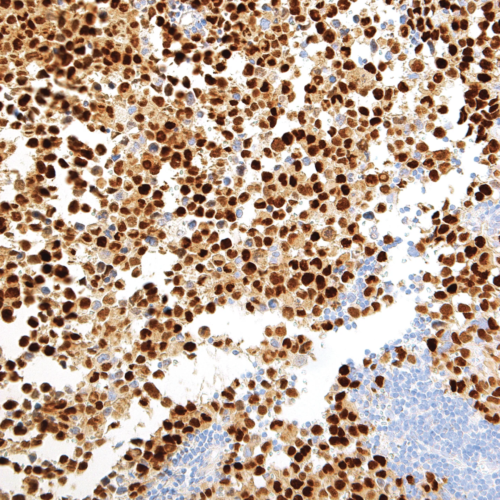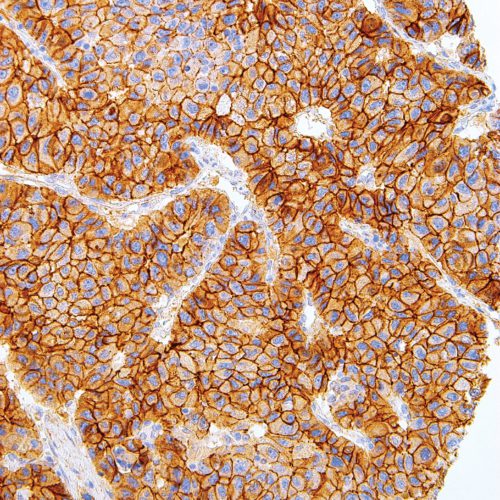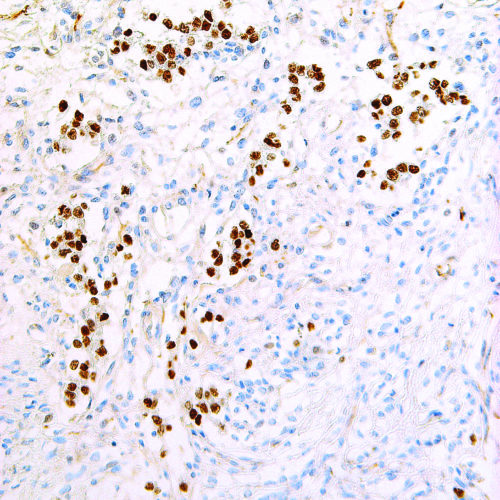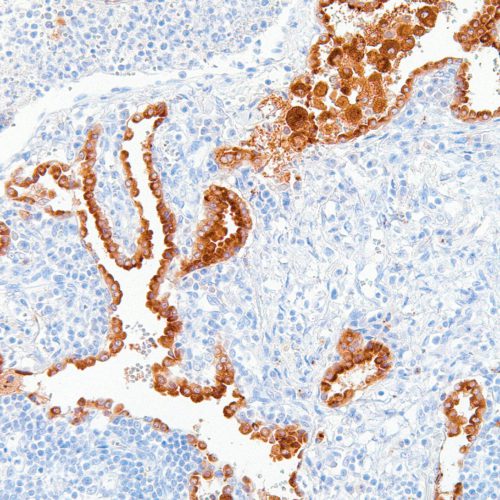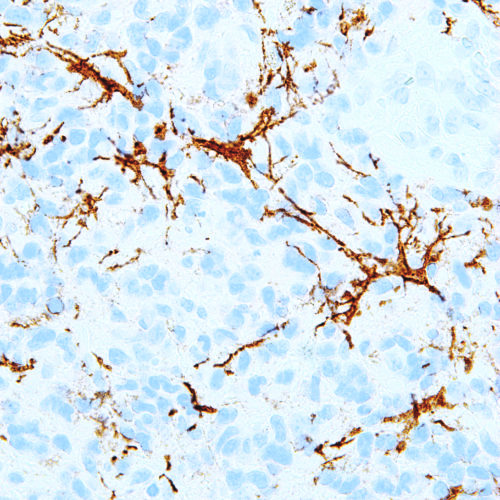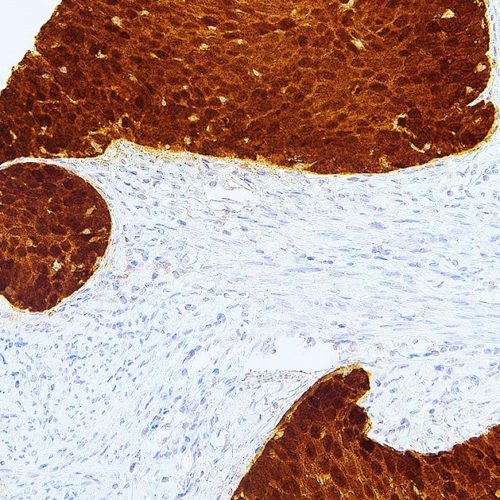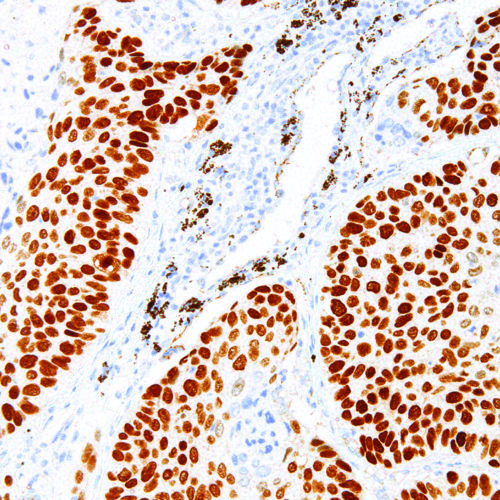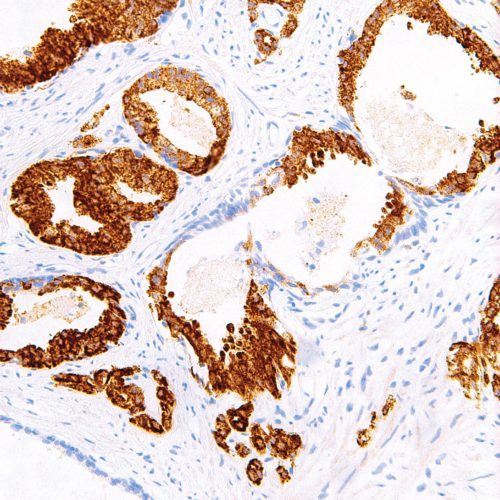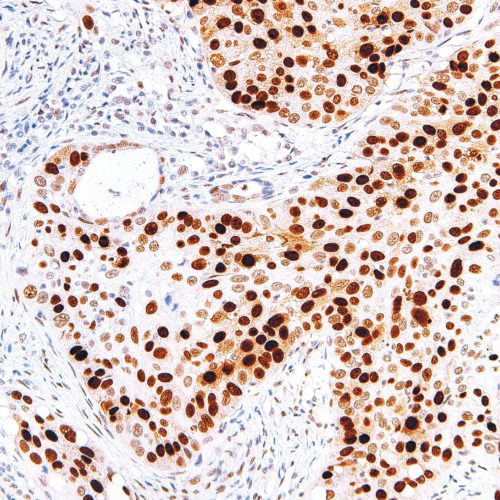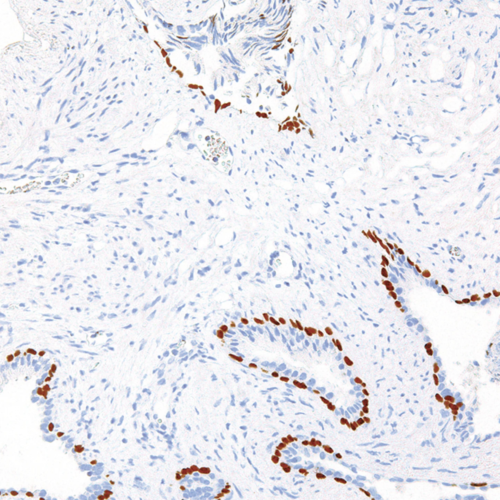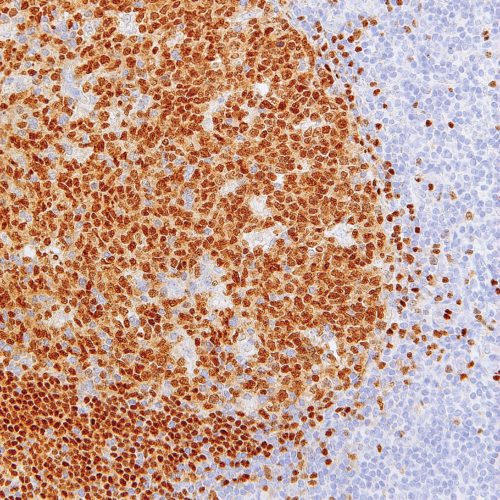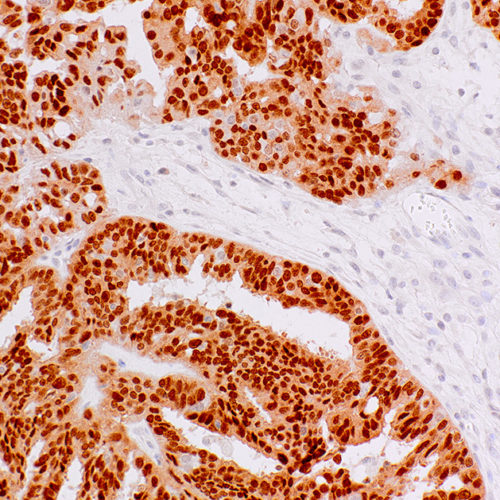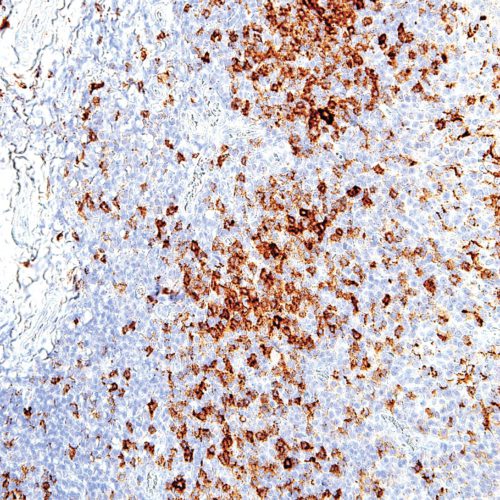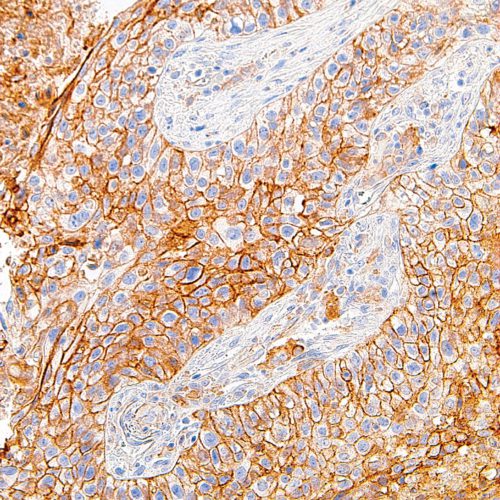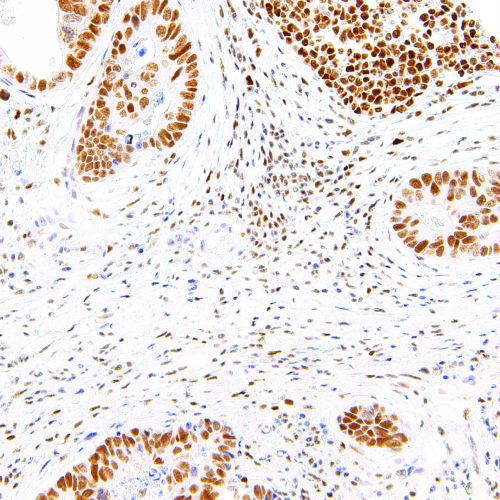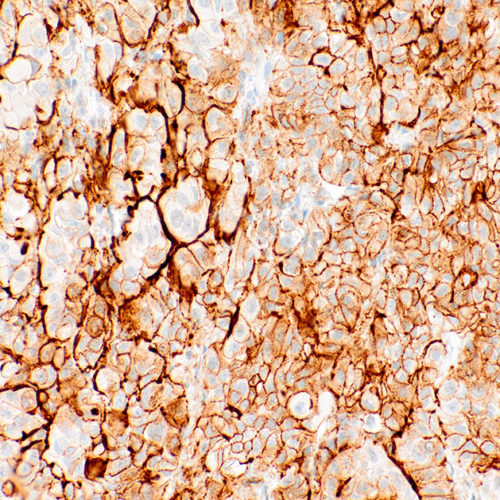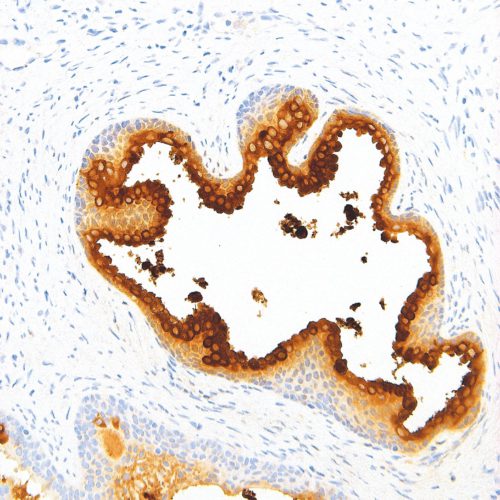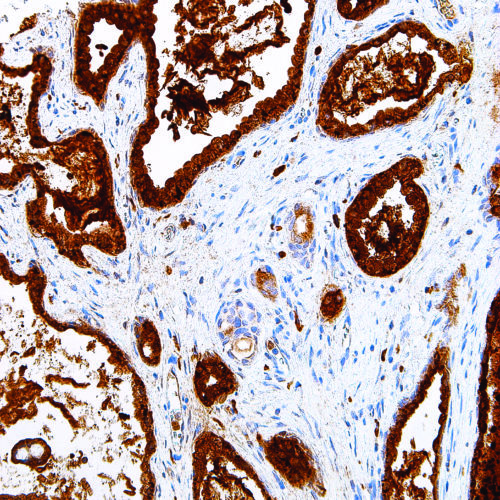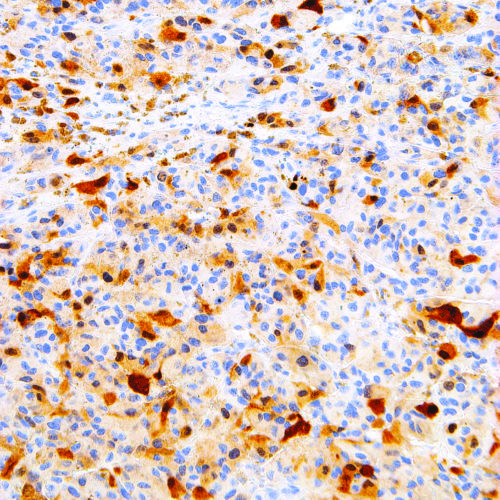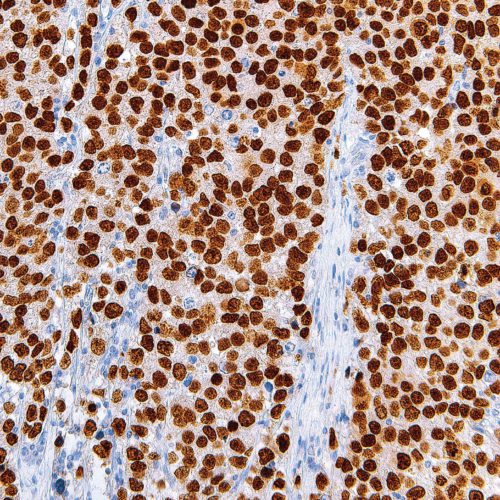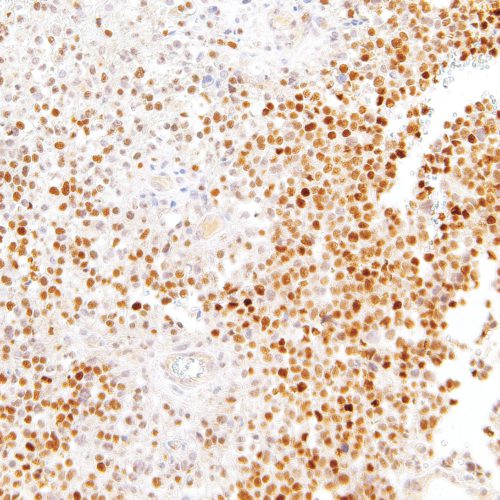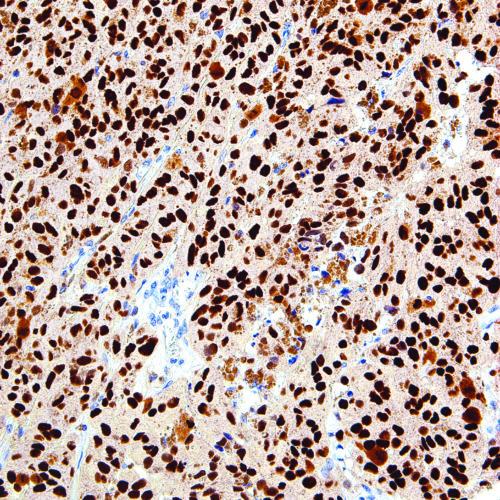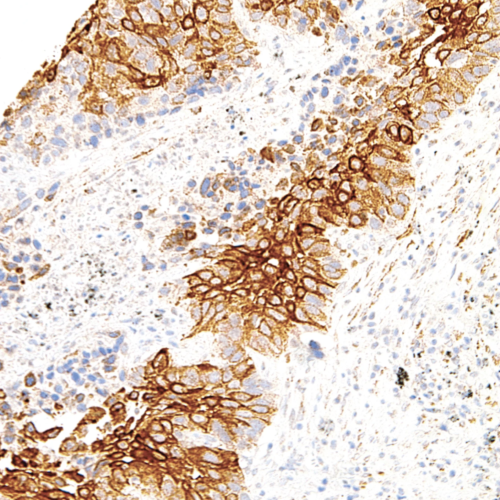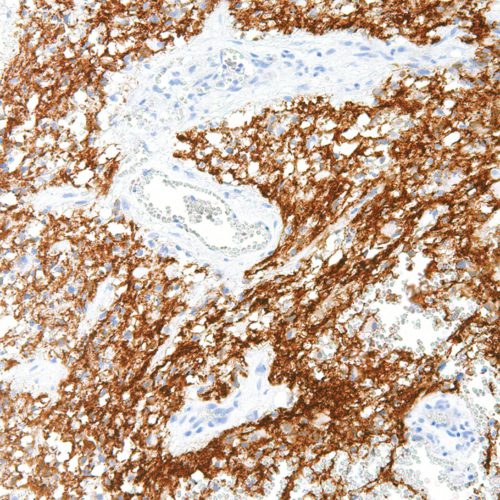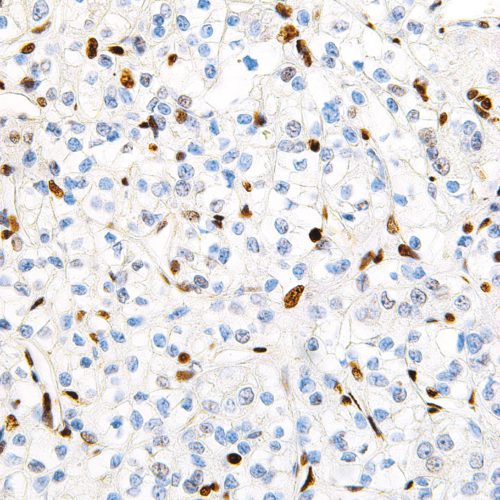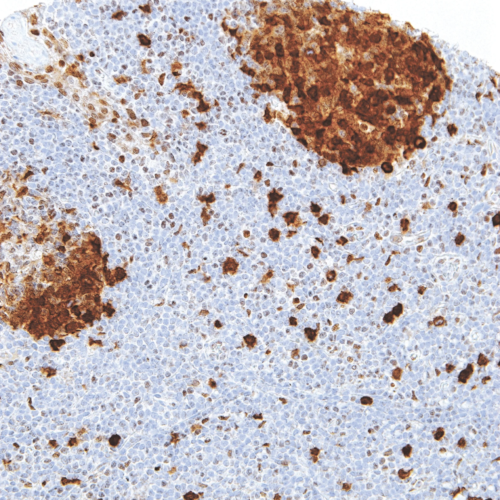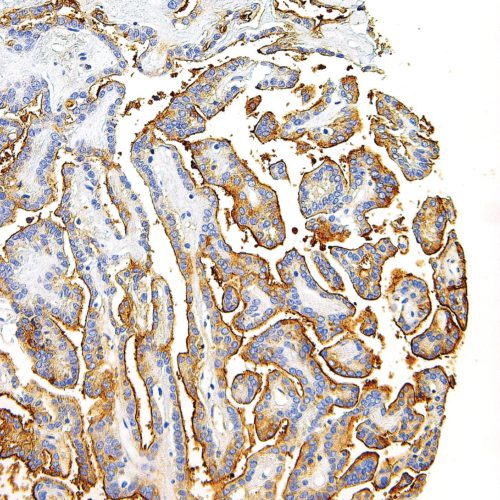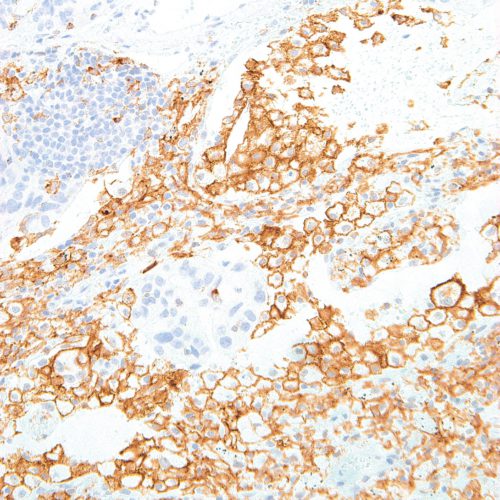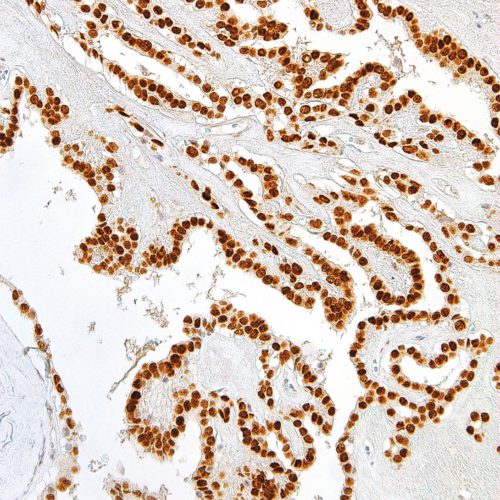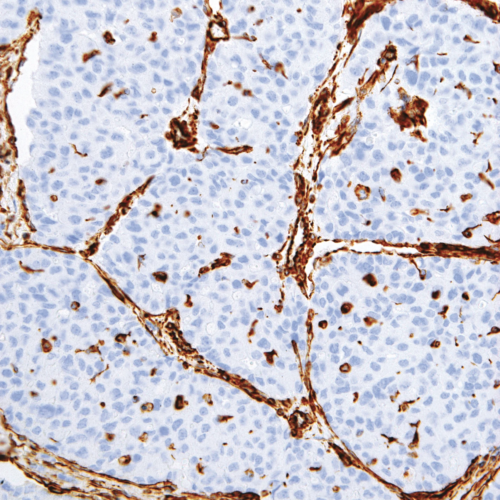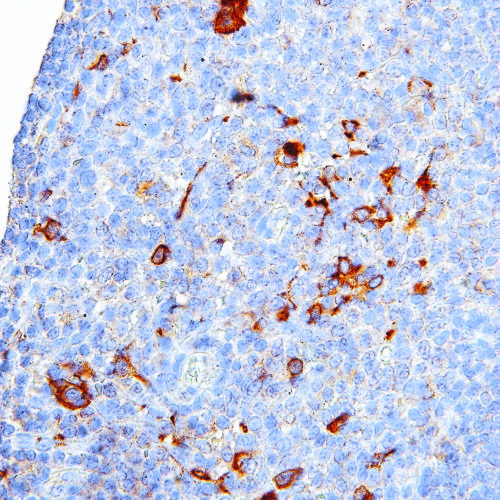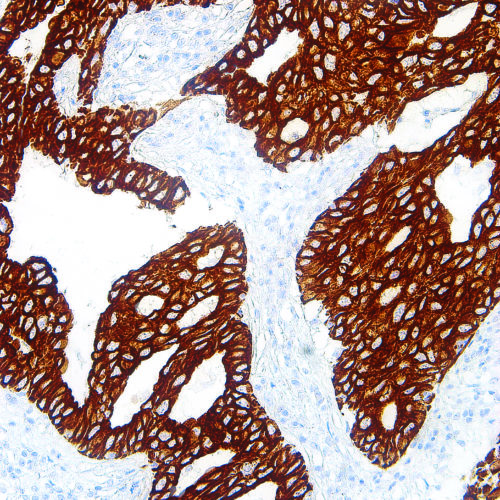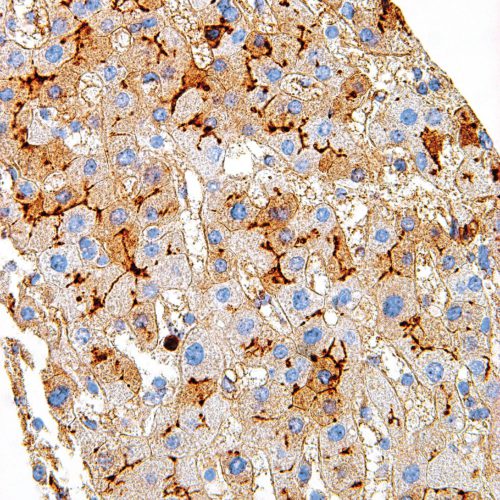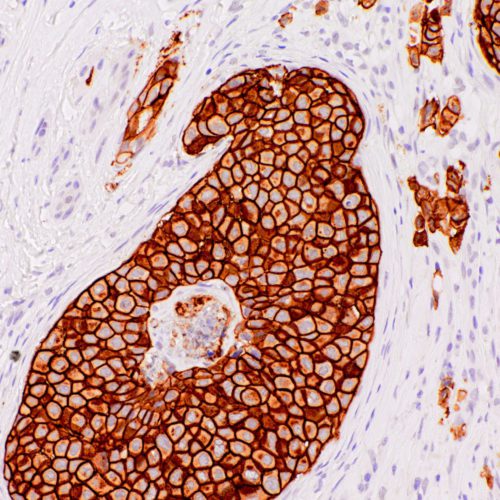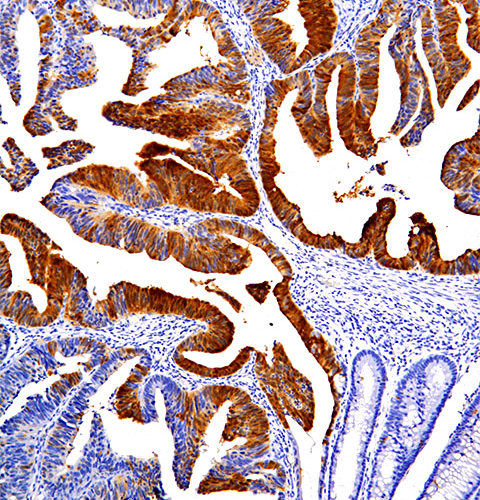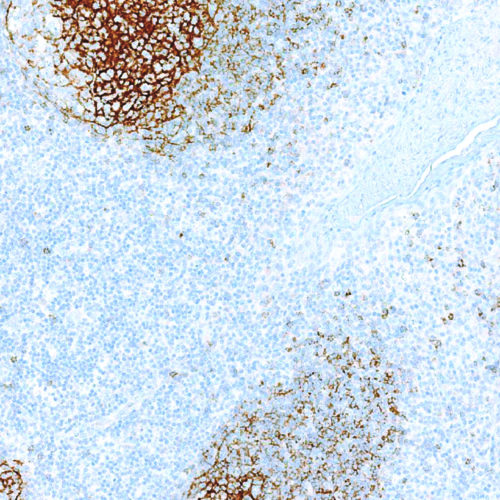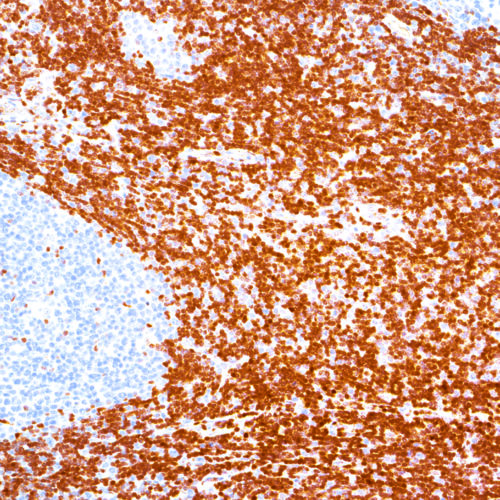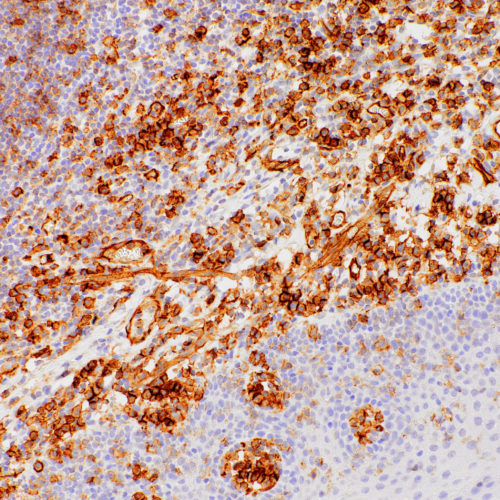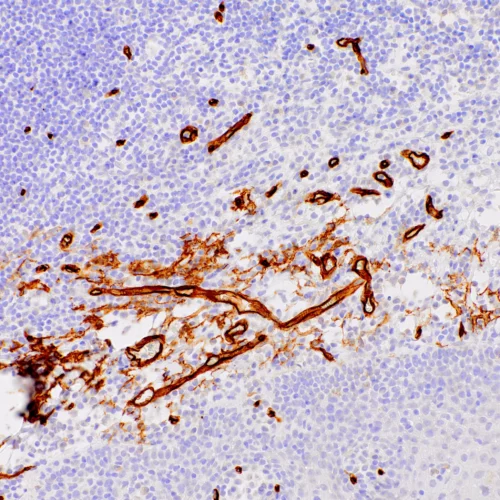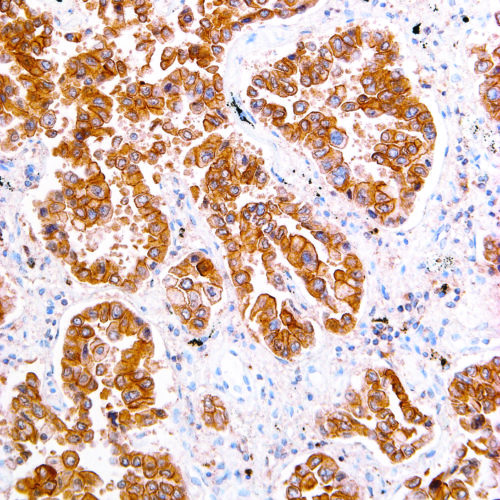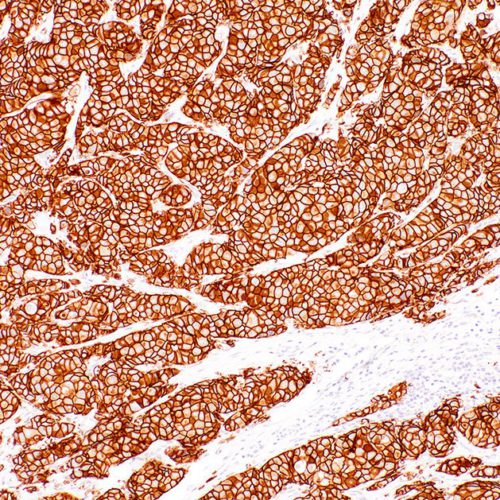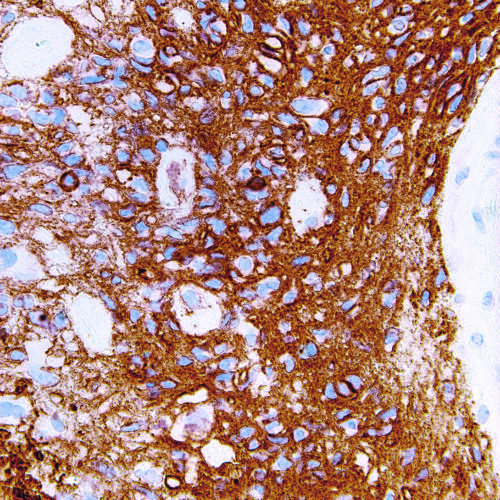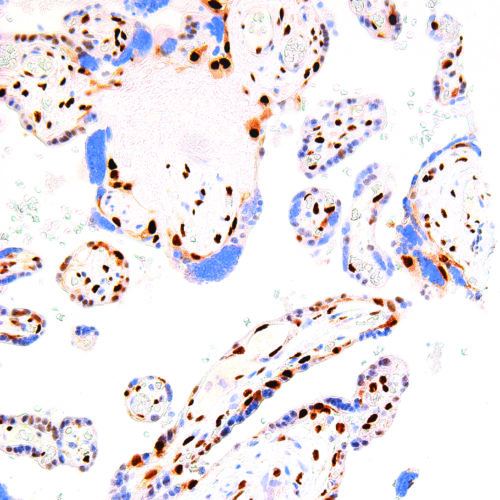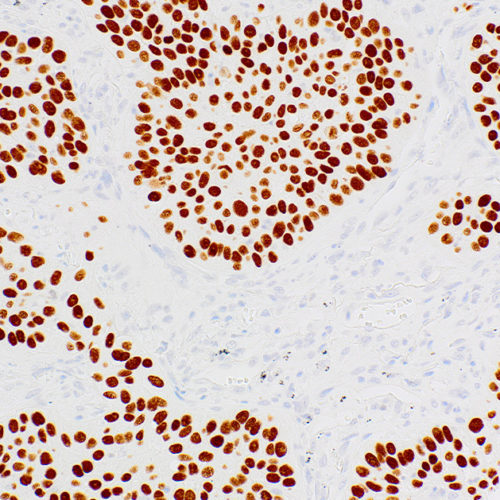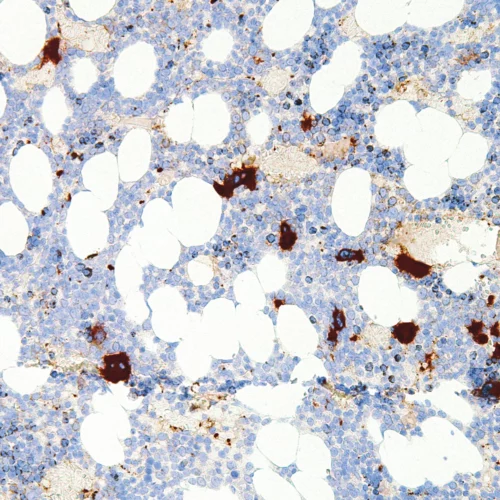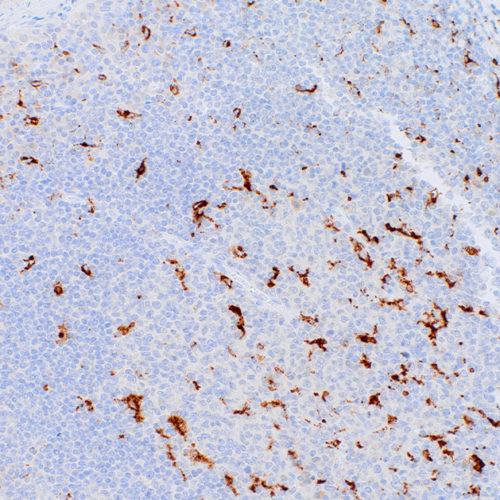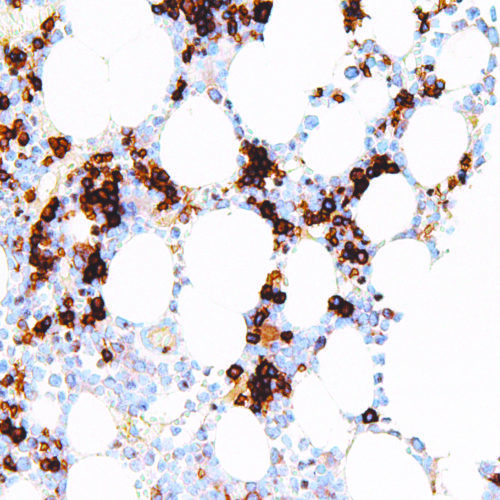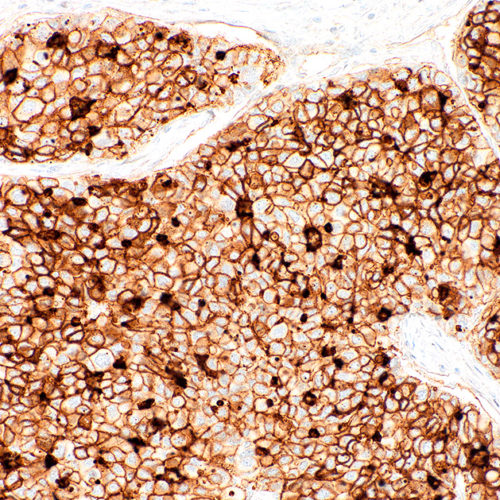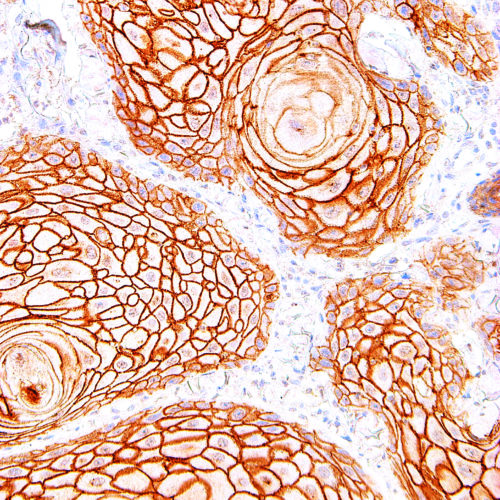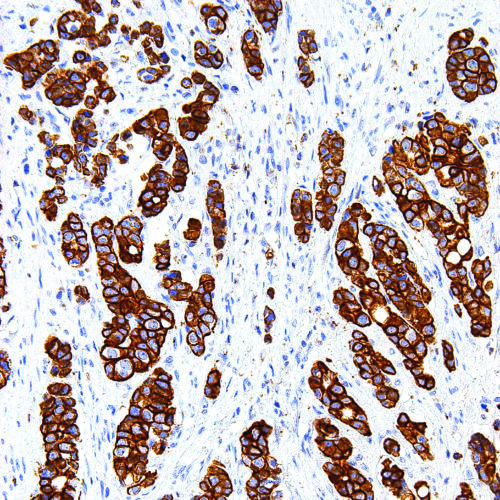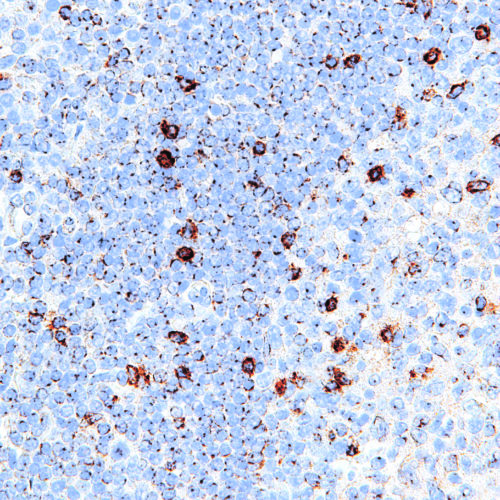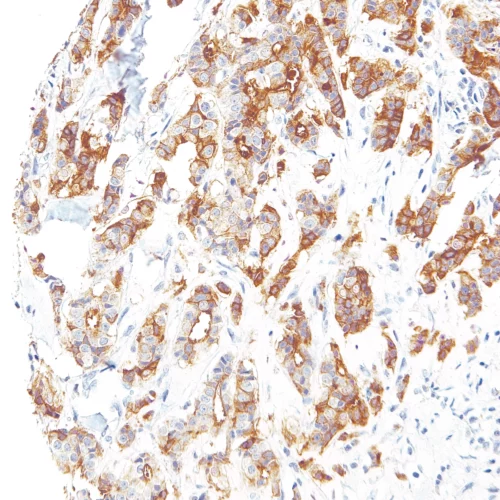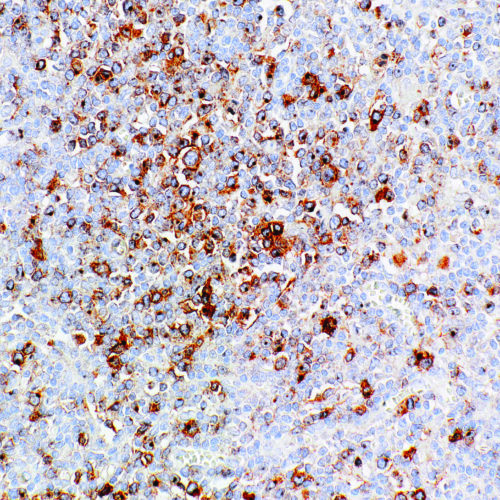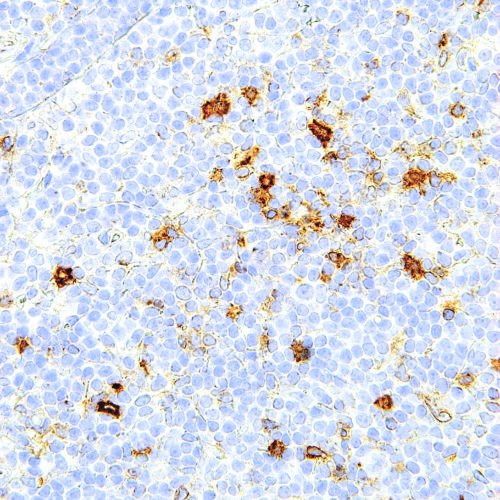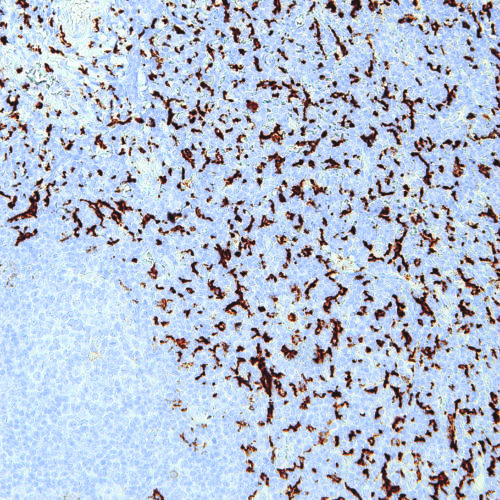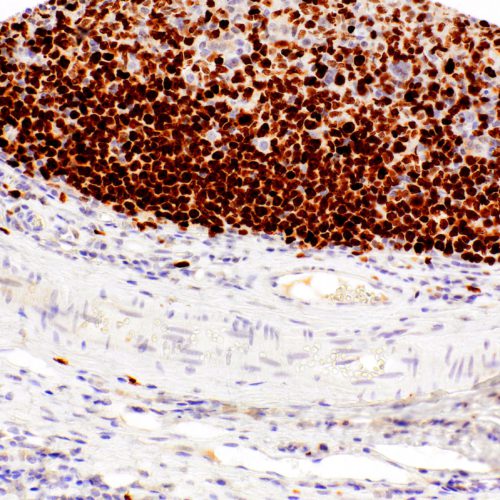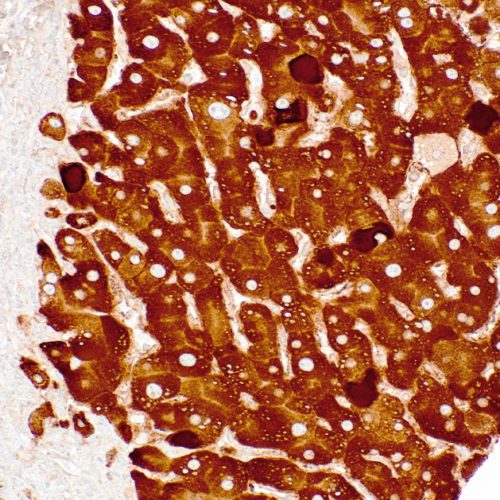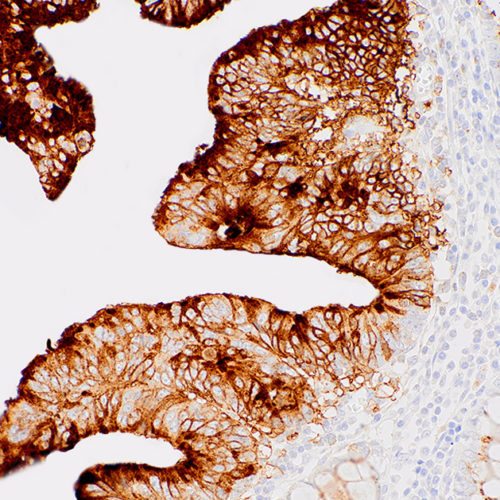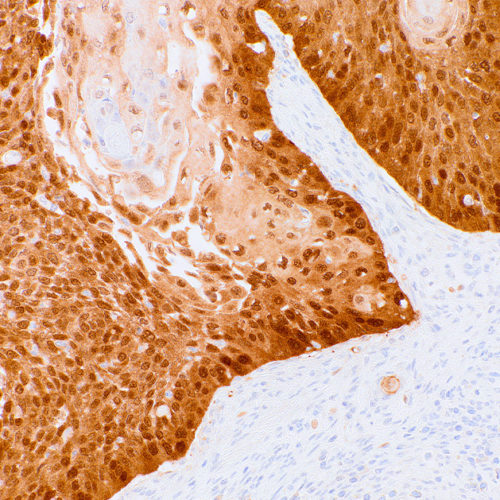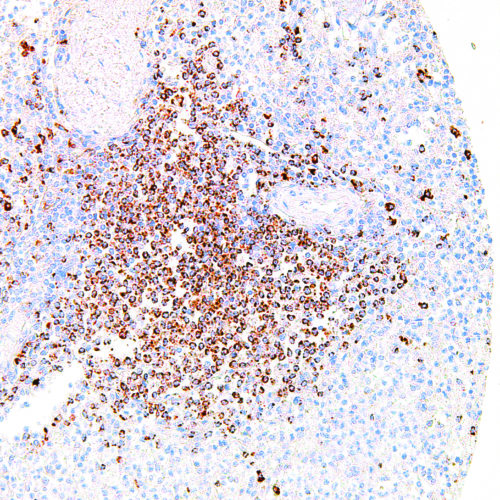Attogene – USA Distributor for GenomeMe
Contact us at sales@attogene.com for further information.
GenomeMe Lab Inc. is a Vancouver-based biotech company specializing in mouse and rabbit IHC (immunohistochemistry) monoclonal antibodies for clinical diagnostic use.
GeneAb™ Actin, Smooth Muscle
$75.00 – $300.00Actin is part of the cytoskeletal system of all cell types. Smooth Muscle Actin is found in myofibroblasts and myoepithelium, but not in cardiac and skeletal muscles. Labelling of smooth muscle actin in concert with muscle specific actin staining can allow for differentiation between rhabdomyosarcoma and leiomyosarcoma, as Muscle specific actin is found in rhabdomyoblasts, while smooth muscle actin is found in leiomyosarcomas.
GeneAb™ Annexin A1
$90.00 – $360.00Annexin A1 (ANXA1) is a membrane protein that plays a role in innate and adaptive immunity by controlling the biosynthesis of inflammation, prostaglandins, and leukotriene mediators. This target is overexpressed in 97% of all samples from patients with with hairy cell leukemia, and is absent in other B-cell lymphomas. High ANXA1 expression is frequently associated with advanced stage esophageal and esophagogastric junction adenocarcinoma, and is also linked to advanced and metastatic disease states.
GeneAb™ Arginase-1
$80.00 – $335.00Arginase-1, encoded by the ARG1 gene, is a cytosolic metalloenzyme expressed predominantly in hepatocytes which plays a key role in the urea cycle by catalyzing the hydrolysis of arginine to ornithine and urea. Argininemia is an inherited autosomal recessive disorder characterized by a buildup of arginine and ammonia in the blood. Anti-Arginase-1 is highly specific for hepatocytes, and is therefore a sensitive and specific marker of benign and malignant hepatic tumors.
GeneAb™ BG8, LewisY
$115.00 – $390.00BG8 LewisY, also known as LewisY blood antigen or simply BG8, is a blood group antigen that has been identified in many studies as a potential marker for differentiation between pulmonary adenocarcinoma (PACA) and epithelioid mesothelioma (EM). It has been reported that sensitivity of non-mesothelial antigens for adenocarcinoma is organ-dependent. When attempting to differentiate epithelioid mesothelioma from adenocarcinoma, BG8 LewisY performed at a sensitivity of 98% in the breast cancer group, and 100% in the lung cancer group.
GeneAb™ BSEP
$145.00 – $670.00Bile Salt Export Pump (BSEP) is a member of the ATP-binding cassette (ABC) transporters, which mediates the transport of bile acid, taurocholate and other cholate conjugates across the hepatocyte canalicular membrane into the canaliculus. BSEP is associated with progressive familial intrahepatic cholestasis type 2 (PFIC2) and benign recurrent intrahepatic cholestasis type 2 (BRIC2). PFIC2 caused by mutations in the BSEP gene increases the risk of hepatocellular carcinoma in early life.
GeneAb™ CA-125
$30.00 – $260.00Annexin A1 (ANXA1) is a membrane protein that plays a role in innate and adaptive immunity by controlling the biosynthesis of inflammation, prostaglandins, and leukotriene mediators. This target is overexpressed in 97% of all samples from patients with with hairy cell leukemia, and is absent in other B-cell lymphomas. High ANXA1 expression is frequently associated with advanced stage esophageal and esophagogastric junction adenocarcinoma, and is also linked to advanced and metastatic disease states.
GeneAb™ CD138
$90.00 – $350.00Cluster of differentiation 138 (CD138), also known as Syndecan-1, is a transmembrane glycoprotein present on the surface of B-cells during late stage differentiation. Anti-CD138 is used to differentiate marginal zone lymphoma from lymphoplasmacytic lymphoma. ALK Large B-Cell Lymphoma (LBCL) commonly stains positively for CD138, but not for CD20 and CD79a. Anti-CD138 reacts positively with HHV8-associated primary effusion lymphoma that lack B-cell markers. CD138 is also a useful marker for identifying and enumerating benign, reactive, or malignant plasma cells from the bone marrow biopsy samples.
GeneAb™ CD15/Leu-M1
$90.00 – $370.00Cluster of differentiation 15 (CD15) is a carbohydrate adhesion molecule. Positive staining for CD15 and negative staining for leukocyte common antigen or other B- or T-cell lineage markers helps recognize Reed Sternberg cells (RSC) in Classical Hodgkin’s Lymphoma (CHL), and distinguishes it from Hodgkin-like neoplasms. CD15 does not stain mesotheliomas and is therefore most useful for distinguishing epithelial mesothelioma from adenocarcinoma.
GeneAb™ CD2
$105.00 – $325.00Cluster of differentiation 2 (CD2) is a useful early T-cell lineage restricted antigen that is present in T-cell differentiation. As a pan-T-cell marker, CD2 staining is used for recognizing practically all normal T-cells, but may be deleted in some T-cell neoplasms. Since CD2 is present in most precursor and mature T-cell leukemias and lymphomas, it is useful in the evaluation of lymphoid malignancies. By using CD2 and CD25 staining, the recognition of systemic mastocytosis and mastocytic leukemia is supported.
GeneAb™ CD44
$45.00 – $160.00Cluster of differentiation 44 (CD44) is a glycoprotein receptor for hyaluronic acid, which plays a fundamental role in cellular adhesion, stromal binding, migration, and cell-cell interactions. Studies have suggested that the CD44-hyaluronate interaction is central to tumor invasiveness. Positive staining with Anti-CD44 is implicated in a multitude of different cancer types, including breast, prostatic, renal cell, colonic, hepatocellular, and genitourinary carcinomas, as well as Non-Hodgkin’s Lymphoma, metastatic melanoma, gastric cancer, and some soft tissue tumors. It has also been demonstrated that there is a positive correlation between tumor progression and increased expression of CD44v, a high molecular weight CD44 isoform that has been described in epithelial cells. Given the expression of CD44 in a wide range of cancers, the most practical application of CD44 immunostaining is its use in discriminating between urothelial transitional cell carcinoma in situ from non-neoplastic changes in the urothelium.
GeneAb™ CD45RA
$65.00 – $210.00CD45R, also known as MB1, is an isoform of CD45 that is a member of the protein tyrosine phosphatase (PTPase) family. CD45R is expressed specifically on the surface of hematopoietic cells, and has demonstrated function as a regulator of the antigen and cytokine receptor signalling of B and T cells. Given that the antigen is located in the membrane of all B cells, with the exception of plasma cells and some mature T cells, Anti-CD45R exhibits specific reactivity with most B lymphocytes. The use of Anti-CD45R is primarily useful in distinguishing B cell lymphomas from T cell lymphomas, with specific reactivity to follicle center cells, mantle cells, some medullary thymocytes, and 80% of B cell lymphomas.
GeneAb™ CD5
$115.00 – $785.00Cluster of differentiation 5 (CD5) is expressed in high levels on the surface of T cells, while controversy surrounds the expression levels and role of CD5 in B cells. As a part of a diagnostic panel, its utility lies predominantly as a marker for T cells, with over 70% of T cell neoplasms expressing CD5. In particular, it is correlated with chronic lymphocytic leukemia/small lymphocytic lymphomas, mantle cell lymphoma, as well as a subset of diffuse large B cell lymphomas. CD5 demonstrates positive expression in thymic carcinomas, and is not as sensitive as CD3. CD5 also has value as a prognostic indicator, being associated with poor prognosis in acute T cell lymphoblastic leukemia.
GeneAb™ CD57
$70.00 – $250.00Cluster of differentiation 57 (CD57), also known as NK-1, is an antigen detectable in natural killer cells, some T-lymphocytes and normal peripheral blood mononuclear cells, myeloid cells, and a variety of polypeptides, lipids, and chondroitin sulfate proteoglycans. CD57 is indicated as a marker for tumors of neuroendocrine origin, including pheochromocytomas, paragangliomas, carcinoid tumor, and medulloblastomas, as well as various neural tumors including neuromas, neurofibromas, schwannomas, and granular cell tumors. CD57 is also detectable in ganglioneuroma and prostate carcinoma. Anti-CD57 is used to distinguish nodular lymphocyte-predominant Hodgkin’s lymphoma from T-cell/histiocyte-rich large B-cell lymphoma, nodular sclerosis Hodgkin’s disease, and follicular lymphoma.
GeneAb™ CDX-2
$85.00 – $635.00CDX-2 is a caudal-related homeobox transcription factor that is expressed by intestinal epithelial cells. CDX-2 is a useful marker for gastrointestinal carcinoma, and for determining the origin of gastrointestinal metastatic adenocarcinoma and carcinoids. Anti-CDX-2 is used for differentiating lung and metastatic colorectal adenocarcinoma, however mucinous ovarian carcinoma also react positively with Anti-CDX-2, thereby limiting the ability to differentiate from metastatic colorectal adenocarcinoma.
GeneAb™ Collagen Type IV
$85.00 – $340.00Collagen Type IV is a primary component in the basal lamina that is used as a marker to observe the presence of the lamina and examine its structure. In addition to the epithelial basal lamina, Anti-Collagen Type IV stains mesenchymal components. It is useful for identifying soft tissue cancers including schwannomas and leiomyomas. Anti-Collagen Type IV frequently reacts with these tissues after becoming well-differentiated and malignant. The use of Anti-Collagen Type IV produces more reliable results than non-specific silver reticulum stains when investigating the vascular elements of neoplasms, hemangiopericytoma, angiosarcoma and epithelioid hemangioendothelioma.
GeneAb™ Cytokeratin 18
$60.00 – $240.00Cytokeratin 18 (CK18) is present in simple, glandular, and transitional epithelial cells, but is absent in stratified epithelial cells. CK18 usually multimerizes with Cytokeratin 8, and Anti-Cytokeratin 18 is useful for detecting adenocarcinomas of simple and glandular epithelium origin, as well as poorly differentiated squamous carcinoma cells.
GeneAb™ Cytokeratin 19
$65.00 – $250.00Cytokeratin 19 (CK19) forms intermediate filaments found in the intracytoplasmic cytoskeleton of epithelial tissue and provides mechanical support. Anti-Cytokeratin 19 stains epithelia and epithelial malignancies such as carcinomas of the colon, stomach, pancreas, biliary tract, liver, and breast. Cytokeratin 19 is a useful marker for distinguishing hepatocellular carcinoma from intrahepatic cholangiocarcinoma. This differentiation is improved when stained in combination with Cytokeratin 7, CAM5.2l, Ber-EP4/MOC31, HepPar1 and TTF1. Cytokeratin 19 staining can also be used to recognize thyroid papillary carcinomas.
GeneAb™ DOG1
$50.00 – $195.00DOG1, also known as Discovered on GIST-1, is a marker that highly specific for gastrointestinal stromal tumor (GIST). Anti-DOG1 is extremely sensitive for the detection of GIST and its diagnosis. Although some GIST stain weakly for c-kit, DOG1 is expressed in the vast majority of GIST cases. Reports have also indicated DOG1 as a marker for salivary acinar and intercalated duct differentiation.
GeneAb™ E-cadherin
$95.00 – $390.00E-cadherin is an intercellular adhesion molecule present in epithelial cells. Anti-E-cadherin stains glandular epithelium, as well as lung, gastrointestinal and ovarian adenocarcinomas. A panel of antibodies against E-cadherin and p120 is also used to differentiate ductal (membranous staining) and lobular breast cancer (cytoplasmic staining). Anti-E-cadherin also stains some thyroid cancers.
GeneAb™ FSH
$110.00 – $460.00Follicle-Stimulating Hormone (FSH) allows for progression of ovarian folliculogenesis, and enables Sertoli cell proliferation in the testis. Anti-FSH reacts with FSH-producing cells, therefore FSH staining is useful for classifying pituitary cancers and understanding pituitary disease.
GeneAb™ GATA3
$120.00 – $595.00GATA3 is a transcription factor important in cell proliferation, development, and differentiation. GATA3 is mostly observed in breast and urothelial carcinomas, and rarely present in other cancers such as endometrial endometrioid adenocarcinoma. Among the breast carcinomas, GATA3 has a lower expression in luminal B subtype breast carcinoma. Studies have found GATA3 expression to be associated with ER (estrogen receptor), PR (progesterone receptor), and Her2 in breast cancer cases. Urothelial carcinomas stain positively for GATA3 in invasive or high grade tumors, therefore Anti-GATA3 is useful for carcinoma diagnosis when breast and bladder are plausible.
GeneAb™ Glycophorin A
$80.00 – $215.00Glycophorin A (GPA) and Glycophorin B (GPB) are erythrocyte blood group determinants that minimize erythrocyte aggregation during the circulation of blood. Anti-Glycophorin A is useful for understanding erythroid cell development and identifying erythroid leukemias.
GeneAb™ Hairy Cell Leukemia
$150.00 – $680.00Anti-Hairy Cell Leukemia stains various B-cells in the follicular mantle zone and virtually all cases of hairy cell leukemia. It also stains some high grade B-cell lymphomas.
GeneAb™ hENT1
$170.00 – $785.00The Human Equilibrative Nucleoside Transporter 1 (hENT1) mediates the cellular uptake of physiologic nucleosides, including adenosine, as well as many anti-cancer drugs including gemcitabine, cytarabine, and decitabine. Deficiency of hENT1 can lead to resistance of such drugs, and the abundance of hENT1 protein in the plasma membrane is a major indicator of the efficiency and clinical outcome of these anti-cancer nucleosides.
GeneAb™ HER2/neu
$90.00 – $450.00The Her2/Neu (c-erbB-2) proto-oncogene is a transmembrane receptor tyrosine kinase that is clinically indicated in a number of carcinomas. Overexpression of the c-erbB-2 protein has been associated with ductal breast cancer, as well as pulmonary and gastric adenocarcinomas. A correlation between Her2 and p53 has also been documented, as overexpression of both proteins has been associated with early invasion and metastasis in bladder cancer.
GeneAb™ IDH1 R132H
$140.00 – $545.00Isocitrate Dehydrogenase 1 (IDH1) is a soluble, cytosolic enzyme involved in the TCA metabolic cycle. The most notable mutation in this enzyme, R132H, is clinically indicated in the majority of astrocytomas and oligodendroglial tumours, with the mutation being associated with more favourable prognosis and increased survival in those patients. IDH1 R132H is also useful in the differential diagnosis between anaplastic glioma and glioblastoma.
GeneAb™ Kappa
$35.00 – $140.00Anti-Kappa recognizes surface immunoglobulin on normal and neoplastic B-cells, and has been indicated as a potential aid in the identification of leukemias, plasmacytomas, and certain non-Hodgkin’s lymphomas, where the expression of a single light chain class is restricted. The determination of light chain ratio is critical in evaluating B-cell neoplasms, as the majority of B-cell lymphomas express either kappa or lambda light chains, while a mixture of kappa and lambda is characteristic of reactive proliferations. In paraffin-embedded tissue, Anti-Kappa displays strong staining of kappa-positive plasma cells, as well as cells that have absorbed exogenous immunoglobulins.
GeneAb™ KBA.62 (Melanoma Associated Antigen)
$100.00 – $370.00KBA.62, also known as Melanoma Associated Antigen, is used to detect an antigen present in melanocytic tumors, such as melanomas, due to its proven sensitivity and specificity. The antibody can also be used to distinguish between junctional nevus and intradermal nevus cells, and fetal melanocytes versus normal adult melanocytes. Studies have shown KBA.62 to be highly useful in differentiating between metastatic amelanotic melanoma and a number of poorly differentiated carcinomas, large cell lymphomas, sarcomas, and spindle cell carcinomas.
GeneAb™ Ki-67
$75.00 – $340.00Ki-67 is a nuclear, non-histone protein that is expressed only during active phases of the cell cycle (G1, S, G2 and M), but not in the resting phases (G0 and G1 early phase). Although the antigen has also been associated with ribosomal RNA transcription, it is strongly linked to cell proliferation and has thus been indicated as an effective marker in grading the proliferation rate of tumors, including those of the brain, breast, cervix, and prostate.
GeneAb™ LMO2
$110.00 – $500.00LMO2, also known as LIM-Only transcription factor 2, RBTN2, or TTG2, is an oncoprotein that is expressed in normal germinal center B-cells, as well as bone marrow hematopoietic precursors and endothelial cells. LMO2 plays a role in angiogenesis and hematopoesis, and its expression has been detected in erythroid and myeloid precursors, megakaryocytes, and also in lymphoblastic and acute myeloid leukemias. LMO2 protein expression has been noted in diffuse large B-cell lymphoma, the most common adult non-Hodgkin lymphoma, as well as follicular lymphoma, a neoplasm derived from germinal center B-cells that accounts for a number of cases of non-Hodgkin lymphomas.
GeneAb™ MDR3
$210.00 – $980.00Multidrug Resistance 3 (MDR3), also known as ATP Binding Cassette Subfamily B Member 4 (ABCB4), is a membrane-associated protein belonging to the superfamily of ATP-binding cassette transporters. MDR3 is an energy-dependent phospholipid efflux translocator that mediates the translocation of phosphatidylcholine across the canalicular membrane of the hepatocyte, and also acts as a positive regulator of biliary lipid secretion. Defects in MDR3 are associated with progressive familial intrahepatic cholestasis type 3 and gallbladder disease type 1. Co-overexpression of MDR3 and MRP1 has been documented as correlating with blastemal subtype and high-risk prognosis of Wilms’ tumor patients.
GeneAb™ MLH1
$95.00 – $455.00MutL Homolog 1 (MLH1) is a protein involved in the mismatch-repair pathway. This protein is commonly associated with hereditary non-polyposis colorectal cancer, as the MLH1 gene is frequently mutated in patients with this cancer. Studies have shown MLH1 to be deficient in a high percentage of patients with microsatellite instability, as well as endometrial and ovarian cancers. Use of Anti-MLH1 is optimized when paired in an IHC panel with MSH6, MSH2, and PMS2. Anti-MLH1 is useful in the detection of MLH1 in a number of normal and neoplastic tissues, and for identifying a loss of MLH1 in tumors that are microsatellite-unstable.
GeneAb™ MSH2
$60.00 – $250.00MutS Homolog 2 (MSH2) is a protein involved in the mismatch-repair pathway. This protein is commonly associated with hereditary non-polyposis colorectal cancer, and mutations in this gene are correlated with the development of sporadic colorectal carcinoma. Expression levels of MSH2 are abnormally low in a high percentage of patients with microsatellite instability, as well as endometrial and ovarian cancers. Use of Anti-MSH2 is optimized when paired in an IHC panel with antibodies against MSH6, MLH1, and PMS2. Reports have shown Anti-MSH2 to be useful in the detection of the protein in a number of normal and neoplastic tissues, and for identifying a loss of MSH2 in tumors that are microsatellite-unstable.
GeneAb™ MSH6
$110.00 – $530.00MutS Homolog 6 (MSH6) is a protein involved in the mismatch repair pathway. This protein is commonly associated with hereditary non-polyposis colorectal cancer, and mutations in this gene are correlated with the development of sporadic colorectal carcinoma. Studies have shown that mutations in MSH6, when co-indicated with mutations in MSH1 and MSH2, contribute to the development of sporadic colorectal carcinoma. Use of Anti-MSH2 is optimized when paired with MSH6, MLH1, and PMS2 in an IHC panel.
GeneAb™ MUC1
$80.00 – $300.00Mucin 1 (MUC1) is a membrane-bound glycoprotein involved in a number of protective and cell-signaling functions, including cell-cell adhesion, proliferation, motility, invasion, and survival. Overexpression of MUC1 is clinically indicated in breast carcinomas, papillary thyroid carcinomas, and thymic carcinomas, and reports have named MUC1 as a useful marker for differentiating thymic carcinoma from type B3 thymoma. The expression of MUC1 is correlated with the grade of malignancy in thymic epithelial tumors, and loss of MUC1 expression has been associated with reactive gastropathy. MUC1 is not expressed in normal human epidermis, but has been detected in the epidermis of psoriatic plaques of biopsies from patients diagnosed with psoriasis vulgaris.
GeneAb™ MUC5AC
$75.00 – $300.00Mucin 5AC (MUC5AC) is a secretory-type mucin found in columnar mucous cells of surface gastric epithelium and in goblet cells of the fetal and precancerous colon, but not in normal colon cells. MUC5AC expression is indicated in carcinomas wherein the type is defined as diffuse and infiltrative, and those located mainly in the antrum. Studies have also suggested a correlation between MUC5AC and colorectal signet-ring cell carcinoma, with overexpression of MUC5AC relating to the carcinogenesis, malignant potential, progression, and clinical behaviors.
GeneAb™ MUC6
$75.00 – $280.00Mucin 6 (MUC6) is a glycoprotein expressed in mucous neck cells, pyloric glands of the antrum, epigastric and bronchial epithelium, and in Müller ducts of the endocervix and urethral epithelium. Anti-MUC6 is useful for differentiating fetal, precancerous, and cancerous colonic mucosa from normal colon, as the antibody does not stain the latter. Anti-MUC6 stains the gastric epithelial surface of normal human gastrointestinal tract.
GeneAb™ Myogenin
$95.00 – $380.00Myogenin belongs to a family of myogenic transcription factors, including MyoD, myf5, and MRF4, which are critical in muscle development. Myogenin is found strictly in cells of skeletal muscle origin, and is therefore used as a biomarker for tumors of the muscle lineage, including alveolar rhabdomyosarcomas. Anti-Myogenin staining may occur in Wilms’ tumor, and labels the nuclei of myoblasts in developing muscle tissue. It is also expressed in some leiomyosarcomas.
GeneAb™ N-cadherin
$210.00 – $980.00N-cadherin, also known as Cadherin-2 (CDH2) or Neural Cadherin (NCAD), is a transmembrane cell adhesion molecule that was originally detected in nervous tissue. It plays an important role in embryogenesis, being involved in gastrulation and neural crest development. N-cadherin is found is cancer cells and allows for transendothelial migration, which is a critical process in the metastasis of cancer. Overexpression and disorderly arrangement of N-cadherin has been noted in dilated cardiomyopathy. It has been suggested that, when considered in adjunct with the status of a number of additional cell-cell adhesion molecules, missense mutations in N-cadherin may be a potential indicator of obsessive-compulsive disorder and Tourette disorder.
GeneAb™ Nanog
$100.00 – $405.00Nanog is a homeoprotein that functions with pluripotent factors such as Oct4 and Sox2 to maintain embryonic stem cell pluripotency. Expression of this protein has been noted in seminoma, dysgerminoma, embryonal carcinoma, and other undifferentiated germ cell tumors, while nanog expression is absent in normal adult organ tissues. Anti-Nanog may be useful in distinguishing between undifferentiated germ cell tumors and non-germ cell tumors.
GeneAb™ Napsin A
$70.00 – $275.00Napsin A is a pepsin-like aspartic proteinase, closely related to Napsin B, expressed mainly in the lung and kidney and which is involved in the correct folding, targeting, and control of aspartic proteinase zymogens. Napsin A expression has been indicated in type II pneumocytes and adenocarcinomas of the lung and kidney. Anti-Napsin A is also useful for differentiating between primary lung adenocarcinomas and adenocarcinomas of other organs, due to the high specificity expression of Napsin A in adenocarcinomas of the lung.
GeneAb™ Nerve Growth Factor Receptor (NGFR)
$115.00 – $520.00Nerve Growth Factor Receptor (NGFR), also known as p75, P-75NTR or CD271, is a neurotrophin receptor belonging to the tumor necrosis factor receptor family. NGFR is expressed mainly in Schwann cells and neurons, as well as a number of other non-neuronal cell types, and functions during central and peripheral nervous system development to regulate neuronal growth, migration, differentiation, and cell death. Nerve Growth Factor Receptor is also expressed in melanocytes, melanomas, neuroblastomas, pheochromocytomas, neurofibromas, neurotized nevi (type C melanocytes), and other neural crest cell or tumor derivatives. It has been suggested that NGFR may act as a tumor suppressor indicated in prostate and urothelial cancer, and Anti-Nerve Growth Factor Receptor (NGFR) is often used in adjunct with S100, to aid in the diagnosis of desmoplastic and neurotrophic malignant melanomas. Anti-NGFR is also useful as an aid in the diagnosis of breast malignancy, as the antibody labels the myoepithelial cells of breast ducts and intralobular fibroblasts of breast ducts.
GeneAb™ p16 INK4A
$135.00 – $545.00The p16 (p16INK4A) protein is a cyclin-dependent kinase inhibitor that plays an important regulatory role in the cell cycle. By controlling the transition between the G1 and S phases through regulation of retinoblastoma protein, p16 decelerates cellular differentiation and therefore acts as a tumor suppressor, making it the key marker in several human cancers including head and neck cancer, perianal lesions, melanomas, gliomas, lymphomas, and some types of leukemia. p16 is also clinically indicated in carcinomas of the esophagus, pancreas, lung, biliary tract, liver, colon, and urinary bladder.
GeneAb™ p40
$130.00 – $535.00Anti-p40 recognizes squamous and basal cells, the shortest variant of p53, and ΔNp63 (an isoform of p63). p40 has been indicated as an alternative to p63 for the detection of Squamous Cell Carcinoma (SqCC), offering the advantage of eliminating potential misinterpretation of a positive adenocarcinoma as a SqCC.
GeneAb™ p504s
$80.00 – $285.00p504s, also known as α-methylacyl coenzyme A racemase (AMACR), is an enzyme localized in the peroxisome and mitochondria, which functions in β-oxidation of branched chain fatty acids, as well as bile synthesis. AMACR has been clinically indicated as a tissue biomarker for prostate cancer and colorectal cancer, as well as high-grade prostatic intraepithelial neoplasia, a precursor lesion of prostate cancer. p504s overexpression has also been detected in a number of other cancers including ovarian, breast, bladder, lung, and renal cell carcinomas, lymphoma, and melanoma.
GeneAb™ p53
$70.00 – $280.00p53, also known as tumor protein 53 or TP53, is a tumor suppressor and transcription factor that functions in a number of anti-cancer activities including DNA repair, cell-cycle arrest, and apoptosis in response to DNA damage or other stressors. Mutations in p53 are linked to a number of malignant tumors, including those of the breast, ovarian, bladder, colon, lung, and melanoma. Anti-p53 staining has been used to detect intratubular germ cell neoplasia, and also to distinguish between uterine serous carcinoma and endometrioid carcinoma.
GeneAb™ p63
$170.00 – $850.00p63 is a tumor suppressor protein that is very similar to p53 in structure and function, while being homologous to p73. p63 is important in development and differentiation, and has been identified as a useful marker for distinguishing between lung squamous cell carcinomas and adenocarcinomas. Anti-p63 is also used to differentiate between benign and malignant prostate and breast lesions, due to its labeling of the nuclei of myoepithelial cells in both tissue types.
GeneAb™ PAX-5
$50.00 – $255.00PAX-5 is a member of the paired box (PAX) family of transcription factors, which are key regulators in early development. The PAX-5 gene encodes the B-cell lineage specific activator protein (BSAP), whose expression is limited to early stages of B-cell differentiation. Anti-PAX-5 is useful in differentiating between classic Hodgkin’s lymphoma versus multiple myeloma and solitary plasmacytoma, as the protein is expressed in mature and precursor B-cell non-Hodgkin’s lymphomas/leukemias while being absent from the other two conditions. Diffuse large B-cell lymphomas are positive for PAX-5, with the exception of those with terminal B-cell differentiation, and T-cell neoplasms do not stain with Anti-PAX-5.
GeneAb™ PAX-8
$150.00 – $780.00PAX-8 is a member of the paired box (PAX) family of transcription factors, which are key regulators in early development. This protein plays a role in development of thyroid follicular cells and the expression of thyroid-specific genes, with mutations in the PAX-8 gene linked to thyroid follicular carcinomas, atypical thyroid adenomas, and thyroid dysgenesis. The PAX-8 protein is expressed in simple ovarian inclusion cysts and non-ciliated mucosal cells of the fallopian tubes, but is absent from normal ovarian surface epithelial cells. PAX-8 is also not expressed in normal lung or lung carcinomas. Reports have associated PAX-8 expression with renal carcinoma, nephroblastoma, and seminoma, and have indicated PAX-8 as a useful marker for renal epithelial tumors, ovarian cancer, and for differential diagnoses in lung and neck tumors. Anti-PAX-8 can be useful in determining the primary site of invasive micropapillary carcinomas of ovary from bladder, lung, and breast, when used in adjunct with a panel of organ-specific markers such as uroplakin, mammaglobin, and TTF-1.
GeneAb™ PD-1
$70.00 – $280.00Programmed Death 1 (PD-1) is a member of the CD28/CTLA-4 family of T-cell regulators, expressed as a co-receptor on the surface of activated T-cells, B-cells, and macrophages. New studies have suggested that the PD-1/PD-L1 signaling pathway may be linked to anti-tumor immunity, as PD-L1 has been shown to induce apoptosis of activated T cells or inhibit activity of cytotoxic T cells. In comparison to CD10 and Bcl-6, PD-1 is expressed by fewer B cells and has therefore been considered a more specific and useful diagnostic marker for angioimmunoblastic T-cell lymphoma. Therapies targeted toward the PD-1 receptor have shown remarkable clinical responses in patients with various types of cancer, including non–small-cell lung cancer, melanoma, and renal-cell cancer.
GeneAb™ PD-L1
$145.00 – $625.00Programmed Death-Ligand 1 (PD-L1), also known as CD274 or B7 Homolog 1 (B7-H1), is a transmembrane protein involved in suppressing the immune system and rendering tumor cells resistant to CD8 T cell-mediated lysis through binding of the Programmed Death-1 (PD-1) receptor. Overexpression of PD-L1 may allow cancer cells to evade the actions of the host immune system. In renal cell carcinoma, upregulation of PD-L1 has been linked to increased tumor aggressiveness and risk of death, and, in ovarian cancer, higher expression of this protein has lead to significantly poorer prognosis. PD-L1 has also been linked to systemic lupus erythematosus and cutaneous melanoma. When considered in adjunct with CD8 tumor-infiltrating lymphocyte density, expression levels of PD-L1 may be a useful predictor of multiple cancer types, including stage III non-small cell lung cancer, hormone receptor negative breast cancer, and sentinel lymph node melanoma.
GeneAb™ PMS2
$70.00 – $400.00Postmeiotic Segregation Increased 2 (PMS2) is a DNA repair protein involved in mismatch repair. Mutations and deficiencies in the PMS2 gene have been linked to microsatellite instability, and malignancies such as hereditary nonpolyposis colorectal cancer and endometrial cancer. Expression levels of the PMS2 protein may be useful as a screening tool for Lynch syndrome after a colorectal cancer diagnosis. Anti-PMS2 is recommended to be used as part of a panel along with antibodies against MLH1, MSH2, and MSH6.
GeneAb™ Podoplanin
$85.00 – $490.00Podoplanin is a transmembrane mucoprotein specifically expressed in the endothelium of lymphatic capillaries, while remaining absent from the blood vasculature. The protein is co-localized with VEGFR3/FLT4 in normal skin and kidney. Anti-Podoplanin is useful in the identification of lymphangiomas, Kaposi’s sarcomas, epithelioid mesotheliomas, hemangioblastomas, seminomas, and some angiosarcomas which likely have lymphatic differentiation.
GeneAb™ PSA
$70.00 – $280.00Prostate-Specific Antigen (PSA) is a serine protease of the kallikrein family, that is produced by the prostate epithelium and epithelial lining of the periurethral glands. Although considered prostate-specific, PSA has also been detected in breast tissue, breast tumors, endometrium, adrenal neoplasms, and renal cell carcinomas. Anti-PSA can be used for differentiating high-grade prostate adenocarcinoma from high-grade urothelial carcinoma, as well as for determining the prostatic origin of carcinomas in non-prostate tissues. Anti-PSA recognizes primary and metastatic prostatic neoplasms, but not tumors of nonprostatic origin, and can be useful as an aid to confirm prostatic acinar cell origin in primary and metastatic carcinomas.
GeneAb™ PSAP
$55.00 – $210.00Prostatic Specific Acid Phosphatase (PSAP) is a prostatic enzyme found in the glandular epithelium of the prostate. PSAP levels are elevated in hyperplastic prostate and prostate carcinoma, with the highest levels being detected in metastasized prostate cancer. Moderate overexpression of PSAP is also characteristic of diseases of the bone (such as Paget’s disease or hyperparathyroidism), diseases of blood cells (such as sickle-cell disease), multiple myeloma, or lysosomal storage diseases (such as Gaucher’s disease). PSAP is considered more sensitive, yet less specific, than PSA, however Anti-PSAP can act as a useful complement to Anti-PSA under suitable clinical contexts.
GeneAb™ S-100
$70.00 – $270.00S-100 is a low-molecular weight protein that is found in Schwann cells, melanocytes, glial cells, histiocytes, lipocytes, skeletal and cardiac muscle, chondrocytes, adipocytes, myoepithelial cells, macrophages, Langerhans cells, dendritic cells, and keratinocytes. S-100 is a useful marker for Schwann cell-derived tumors, as well as a number of well-differentiated tumors of the salivary gland, adipose and cartilaginous tissue. Anti-S-100 is used to detect melanomas, histiocytosis X, malignant peripheral nerve sheath tumors, and clear cell sarcomas.
GeneAb™ SALL4
$75.00 – $330.00Sal-Like Protein 4 (SALL4), is a zinc finger transcription factor found in germ cells and human blood progenitor cells, with functional involvement in modulating Oct-4 to maintain embryonic stem cell pluripotency. SALL4 is a useful marker for acute myeloid leukemia, B-cell acute lymphocytic leukemia, intratubular germ cell neoplasia, seminomas/dysgerminomas, and yolk sac tumors (both pediatric and postpubertal). Anti-SALL4 is used to detect embryonal carcinomas, hepatocellular carcinoma (HCC), gliomas, ovarian primitive germ-cell tumors, choriocarcinomas, spermatogonia, teratoma, gastric cancer, breast cancer, and lung cancer. Expression of SALL4 is often associated with poor prognosis in HCC, and with metastasis in endometrial cancer, colorectal carcinoma, and esophageal squamous cell carcinoma.
GeneAb™ SOX-11
$125.00 – $510.00SRY (Sex Determining Region Y)-Box 11 (SOX-11), also known as transcription factor SOX-11, is a nuclear transcription factor that acts in regulation of embryonic development and in cell differentiation. SOX-11 is expressed in the development of the human central nervous system, medulloblastoma, and glioma, and has been indicated as a marker for both Cyclin D1-positive and negative mantle cell lymphomas, Burkitt lymphoma, and lymphoblastic lymphoma.
GeneAb™ SOX10
$100.00 – $415.00SRY (Sex Determining Region Y)-Box 10 (SOX-10), also known as transcription factor SOX-10, is a nuclear transcription factor that acts in regulation of embryonic development and in the specification and differentiation of cells of melanocytic lineage. SOX-10 is diffusely expressed in neurofibromas and schwannomas, and mutations in the SOX-10 gene are linked to Waardenburg-Shah and Waardenburg-Hirschsprung disease. Anti-SOX-10 has been shown to be sensitive for conventional, spindled, and desmoplastic melanoma, and has been used to detect metastatic melanoma and nodal capsular nevus in sentinel lymph nodes.
GeneAb™ TAG-72
$95.00 – $370.00Tumor-Associated Glycoprotein 72 (TAG-72) is a glycoprotein found on the surface of many cancer pathologies. Anti-TAG-72 can be useful for detecting some adenocarcinomas and non-neoplastic tissues. This diagnostic grade TAG-72 IVD antibody is useful for identifying adenocarcinomas in positive staining, but in mesotheliomas no staining is observed.
GeneAb™ Tau
$75.00 – $280.00Tau proteins are abundant in neurons of the central nervous system, and function in microtubule stability and organization. Defects in Tau functioning and aggregation of these proteins have been clinically linked to a number of neurodegenerative disorders including Alzheimer’s disease, Parkinson’s disease, Pick’s disease (PiD), progressive supranuclear palsy (PSP), cortical basal degeneration (CBD), and frontotemporal dementia with parkinsonism linked to chromosome 17 (FTDP-17).
GeneAb™ TFE3
$100.00 – $490.00Transcription Factor E3 (TFE3) is a transcription factor that binds to the MUE3-type E-box sequences involved in TGF-β signalling. Anti-TFE3 staining is the most sensitive and specific indicator of Xp11 translocation renal cell carcinomas. Since alveolar soft part sarcoma (ASPS) is characterized by a specific chromosomal rearrangement resulting in a chimeric transcription factor (ASPSCR1-TFE3), this TFE3 IVD antibody is also a useful diagnostic tool for recognizing ASPS.
GeneAb™ Thymidylate Synthase
$125.00 – $620.00Thymidylate Synthase (TS) is a crucial enzyme responsible for the synthesis of 2′-deoxythymidine-5′-monophosphate (dTMP) a precursor for thymidylate which is necessary for DNA replication and repair from 2′-deoxyuridine-5′-monophosphate (dUMP). In terms of cancer, TS is an important target for cancer treatment as the inhibition of TS and therefore nucleotide synthesis necessary for cell growth has shown to be a vital part for successful treatment against colorectal, pancreatic and breast cancers.
GeneAb™ Thyroglobin
$95.00 – $480.00Thyroglobulin is a precursor to the thyroid hormones T4 and T3 and is present in the thyroid follicular cells. Nearly all thyroid follicular carcinomas stain for thyroglobulin and sometimes produce a focal staining pattern. Conversely, poorly differentiated carcinomas and non-thyroid adenocarcinomas do not stain for thyroglobulin, therefore this Thyroglobulin IVD antibody is a useful diagnostic tool for recognizing papillary and follicular thyroid carcinomas. A panel of Anti-Thyroglobulin and Anti-Calcitonin is useful for identifying medullary thyroid carcinomas, whereas a panel of Anti-Thyroglobulin and Anti-TTF1 is useful for distinguishing between primary thyroid and lung neoplasms.
GeneAb™ TIM3
$175.00 – $860.00T-cell Immunoglobulin and Mucin-Domain-Containing Molecule-3 (TIM3) is present on T-helper type 1 lymphocytes and other immune cells including dendritic cells and natural killer cells. TIM3 is overexpressed in CD4 tumor-infiltrating lymphocytes, including those with non-small cell lung cancer associated with poor prognoses. TIM3 has recently emerged as a potential target for cancer immunotherapy.
GeneAb™ TTF-1
$50.00 – $160.00Thyroid Transcription Factor 1 (TTF-1) is present in diencephalon, lung, and thyroid. Anti-TTF-1 stains thyroid and thyroid-derived tumors, and is therefore used for distinguishing lung adenocarcinoma from germ cell tumors, malignant mesothelioma, and metastatic carcinomas from organs other than the thyroid. It is also useful for distinguishing small cell lung carcinoma from lymphoid infiltrates, and pulmonary from non-pulmonary adenocarcinomas in malignant effusions. The ability to distinguish between pulmonary and non-pulmonary adenocarcinomas is particularly useful in identifying tumors that have metastasized to the brain.
GeneAb™ Vimentin
$60.00 – $290.00Vimentin is a component of intermediate filament in mesenchymal cells, such as endothelial cells, fibroblasts, lymphocytes, and melanocytes. Anti-Vimentin is useful for assessing whether tissue samples have been processed and preserved properly. A panel of Anti-Vimentin and Anti-Keratin is useful for differentiating melanomas from large cell lymphomas and undifferentiated carcinomas. This diagnostic grade Vimentin IVD antibody stains melanomas and schwannomas, as well as Endometrial endometrioid adenocarcinomas.
GeneAb™ CTLA-4
$120.00 – $920.00Cytotoxic T-Lymphocyte-Associated Protein 4 (CTLA-4) is a receptor on T helper cells that functions as an immune checkpoint and downregulator of immune responses. Mutations in CTLA-4 are associated with insulin-dependent diabetes mellitus, Hashimoto’s thyroiditis, Graves’ disease, systemic lupus erythematosus (SLE), celiac disease, primary biliary cirrhosis, thyroid-associated orbitopathy, multiple sclerosis, and other autoimmune diseases. The spliced variant of CTLA-4 in SLE is present in the patient’s serum. Haploinsufficiency of CTLA-4 causes the immune system disorder known as CTLA-4 deficiency or CHAI disease (CTLA-4 haploinsufficiency with autoimmune infiltration).
GeneAb™ Cytokeratin 7
$95.00 – $420.00Cytokeratin 7 (CK7) is a type II keratin which is present in transitional, ductal, glandular, and biliary duct epithelial cells. Cytokeratin 7 is a useful marker for distinguishing between carcinomas of the lung, breast, endometrium, and urothelia (positive stain) from carcinomas of the colon and prostate (negative stain). Cytokeratin 7 is present in nearly all primary lung adenocarcinomas, and is a useful marker in the differential diagnosis of ovarian neoplasms. Anti-Cytokeratin 7 does not stain intermediate filament.
GeneAb™ CD13
$190.00 – $855.00Cluster of Differentiation 13 (CD13) is a transmembrane protein that is overexpressed in both hematological and solid malignancies, including Acute Myeloid Leukemia (AML). Although hypogranular variants of AML are difficult to distinguish from other AML subtypes due to the morphology, the diagnosis of this variant is possible through using a panel of CD13, CD16, CD33, CD34, and CD117. Alternatively, a panel of CD13, CD34, CD43, CD68, CD117, CD163, lysozyme, and MPO is very useful for accurately diagnosing myeloid sarcoma and distinguishing it from large cell lymphoma, undifferentiated carcinoma, lymphoblastic lymphoma, malignant melanoma, Burkitt’s lymphoma, extra-medullary hematopoiesis, and inflammation. Since CD13 is expressed in both normal and neoplastic liver tissues, CD13 staining is useful for distinguishing between hepatocellular carcinoma and non-hepatocellular neoplasms.
GeneAb™ HER2/neu
$90.00 – $450.00The HER2/neu (c-erbB-2) proto-oncogene is a transmembrane receptor tyrosine kinase that is clinically indicated in a number of carcinomas. Overexpression of the c-erbB-2 protein has been associated with ductal breast cancer, as well as pulmonary and gastric adenocarcinomas. A correlation between HER2 and p53 has also been documented, as overexpression of both proteins has been associated with early invasion and metastasis in bladder cancer.
GeneAb™ p16 INK4A
$135.00 – $545.00The p16 (p16INK4A) protein is a cyclin-dependent kinase (CDK) inhibitor that plays an important regulatory role in the cell cycle. By controlling the transition between the G1 and S phases through regulation of retinoblastoma protein, p16 decelerates cellular differentiation and therefore acts as a tumor suppressor, making it the key marker in several human cancers including head and neck cancer, perianal lesions, melanomas, gliomas, lymphomas, and some types of leukemia. p16 is also clinically indicated in carcinomas of the esophagus, pancreas, lung, biliary tract, liver, colon, and urinary bladder.
GeneAb™ CD23
$105.00 – $315.00Cluster of Differentiation 23 (CD23) is found on interleukin-4 activated B-cells, activated macrophages, eosinophils, and follicular dendritic cells, and is a receptor for IgE, an antibody involved in parasitic immunity. CD23 is present on Reed-Sternberg cells in Hodgkin’s disease. Follicular dendritic cells and activated B-lymphocytes produce strong staining in germinal centers and weak patterns in mantle zone B-cells. CD23 is helpful in differentiating chronic lymphocytic leukemia from mantle cell leukemia. Small B-cell lymphomas are sometimes positive, while precursor B- and T-lymphomas, myeloid neoplasms, and mature T-cell lymphomas stain negatively with Anti-CD23.
GeneAb™ p27
$100.00 – $370.00p27, also known as p27Kip1, is a cyclin-dependent kinase inhibitor that binds to and inhibits cyclin-dependent kinases, thereby regulating progression from G1 to S phase. Decreased expression of p27 is linked to poor prognosis in renal cell carcinoma, colon carcinoma, small breast carcinomas, non-small cell lung carcinoma, hepatocellular carcinoma, multiple myeloma, lymph node metastases in papillary carcinoma of the thyroid, and is associated with a more aggressive phenotype of carcinoma in the cervix.
GeneAb™ CD31
$75.00 – $305.00Cluster of Differentiation 31 (CD31) is present on hematopoietic stem cells (HSCs), and its expression is used to determine the concentration of HSCs in research studies and for bone marrow transplantation. Anti-CD31 is very specific and sensitive for endothelial cells and does not stain non-vascular tumours, therefore CD31 staining is used to recognize the vascular origins of neoplasms.
GeneAb™ CD34
$66.00 – $385.00Cluster of Differentiation 34 (CD34) is a transmembrane glycoprotein expressed on hematopoietic stem and progenitor cells, vascular endothelium, embryonic fibroblasts, and rare glial cells in nervous tissue. CD34 is the most used marker for characterizing blasts in leukemia. CD34 is also present in some soft tissue tumours including solitary fibrous tumours and gastrointestinal stromal tumours. Proliferating endothelial cells seem to upregulate CD34 expression. Although specificity is low, Anti-CD34 reacts positively with more than 85% of angiosarcoma and Kaposi’s sarcoma.
GeneAb™ ROS1
$190.00 – $855.00ROS1 serves as a receptor tyrosine kinase. Gene rearrangement events involving ROS1 have been described in lung and other cancers, and such tumours have been found to be remarkably responsive to small molecule tyrosine kinase inhibitors. Multiple studies have observed ROS1 gene rearragement events in approximately 1% of lung cancers and showed that inhibition of tumour cells bearing ROS1 gene fusions by crizotinib or other ROS1 tyrosine kinase inhibitors was effective in vitro.
GeneAb™ HER2/neu
$90.00 – $450.00The HER2/neu (c-erbB-2) proto-oncogene is a transmembrane receptor tyrosine kinase that is clinically indicated in a number of carcinomas. Overexpression of the c-erbB-2 protein has been associated with ductal breast cancer, as well as pulmonary and gastric adenocarcinomas. A correlation between HER2 and p53 has also been documented, as overexpression of both proteins has been associated with early invasion and metastasis in bladder cancer.
GeneAb™ CD56
$50.00 – $160.00Cluster of Differentiation 56 (CD56), also known as Neural-Cell Adhesion Molecule (NCAM), is a glycoprotein involved in synaptic plasticity, cell-cell adhesion, neurite outgrowth, learning, and memory. NCAM is expressed in normal neurons, glia, natural killer cells, activated T-cells, brain and cerebellum, neuroendocrine tissues, and skeletal muscle. Anti-CD56 recognizes a number of tumours including myeloma, myeloid leukemia, natural killer/T-cell lymphomas, neuroendocrine tumours, pancreatic acinar-cell carcinoma, pheochromocytoma, and Wilm’s tumour. CD56 is detectable in neoplasms that are neuroectodermally-derived, such as retinoblastoma, medulloblastomas, astrocytomas, small cell carcinomas, and neuroblastomas. It has also been linked to rhabdomyosarcoma, a tumour that is mesodermally-derived.
GeneAb™ p57 kip2
$115.00 – $860.00p57Kip2, also known as p57, is a tumour suppressor protein that causes cell cycle arrest at G1 by binding to G1 cyclin-CDK complexes. The p57Kip2 gene is a potential tumour suppressor target as the gene is located in a chromosomal region implicated in sporadic cancers, Wilms’ tumour, and Beckwith Wiedemann syndrome. Anti-p57Kip2 labels many cytotrophoblast nuclei and stromal cells in normal placenta, and is useful in differentiating between complete hydatidiform mole and partial hydatidiform mole or hydropic abortion.
GeneAb™ p40
$145.00 – $560.00Anti-p40 recognizes squamous and basal cells, the shortest variant of p53, and ΔNp63 (an isoform of p63). p40 has been indicated as an alternative to p63 for the detection of Squamous Cell Carcinoma (SqCC), offering the advantage of eliminating potential misinterpretation of a positive adenocarcinoma as a SqCC.
GeneAb™ CD61
$125.00 – $665.00Cluster of Differentiation 61 (CD61), also known as Glycoprotein IIIa or GPIIIa, is an antigen expressed on megakaryocytes, platelets, myeloid cells, monocytes, endothelial cells, smooth muscle cells, and macrophages. It is involved in platelet aggregation and acts as a receptor for fibrinogen, fibronectin, von Willebrand factor, and vitronectin. Anti-CD61 is used for identifying megakaryocytopoiesis, as seen in megakaryoblastic leukemias, myelodysplastic disorders, and acute myeloid leukemias. CD61 is also indicated as a marker for platelet adhesion in advanced atherosclerosis and has been reported in the identification of fat embolism in pulmonary tissue.
GeneAb™ CD68
$80.00 – $305.00Cluster of Differentiation 68 (CD68) is a heavily glycosylated transmembrane antigen that is detected in lysosomes, tissue macrophages, Langerhans cells, dendritic cells, monocytes, Kupffer cells, osteoclasts, and granulocytes. Anti-CD68 may be useful in identifying myelomonocytic and histiocytic tumours, and for differentiating between malignant fibrous histiocytoma and other pleomorphic sarcomas. However, other lysosome-rich cells may also stain, since Anti-CD68 detects a formalin-resistant epitope that may be associated with lysosomal granules.
GeneAb™ CD71
$75.00 – $340.00Cluster of Differentiation 71 (CD71), also known as Transferrin Receptor Protein 1 (TfR1) or the transferrin receptor, is a cell surface proliferation marker that is involved in the cellular uptake of iron. CD71 is most highly expressed in early erythroid precursors and is fully absent from mature erythrocytes; CD71 is therefore highly useful as a marker for erythroid components within bone marrow biopsy specimens, without interference from mature erythrocytes. CD71 expression has been indicated in invasive breast carcinoma with acquired resistance to tamoxifen, and has been linked to poor prognosis in ER+/luminal-like breast cancer. Anti-CD71 is used in the determination of erythroid leukemia, benign erythroid proliferative disorders, and myelodysplastic syndrome.
GeneAb™ CD73
$225.00 – $880.00Cluster of Differentiation 73 (CD73), also known as Ecto-5′-Nucleotidase (ecto-5′-NT), is a cell surface enzyme found in most tissues. CD73 catalyzes the breakdown of AMP to adenosine, thereby modulating inflammatory and T-cell responses. Reports have implicated CD73 expression in tumour progression and carcinogenesis, as CD73 is a key regulatory molecule in the proliferation, migration, and invasion of cancer cells in vitro, as well as tumour angiogenesis and tumour immune escape in vivo. Due to this key involvement in cancer, CD73 has become an appealing target for cancer immunotherapy. CD73 expression has also been linked to favourable prognosis in breast carcinoma.
GeneAb™ Desmoglein-3
$125.00 – $570.00Desmoglein-3 Antibody (DSG3) is a component of desmosomes in vertebrate epithelial cells. It identifies pulmonary squamous cell carcinomas from other types of lung cancer with high specificity and sensitivity. Studies show the upregulation of DSG3 correlated with metastasis in a number of cancers including lung cancers. The expression of DSG3 indicates a poor prognosis and portends a more aggressive clinical outcome.
GeneAb™ CD99
$110.00 – $635.00Cluster of Differentiation 99 (CD99) is a glycosylated transmembrane protein expressed by lymphocytes, cortical thymocytes, granulosa cells of the ovary, pancreatic islet cells, Sertoli cells, and endothelial cells. CD99 produces diffuse membrane staining patterns on nearly all Ewing’s sarcoma and primitive peripheral neuroectodermal tumours. CD99 may be found in synovial sarcoma, neuroendocrine carcinoma, acute myeloid leukemia, mesenchymal chondrosarcoma, lymphoblastic lymphoma, small round blue cell tumours, solitary fibrous tumours, vascular tumours, and myeloid sarcoma. It produces heterogeneous staining patterns which must be accompanied by other antibody staining for a final diagnosis.
GeneAb™ LAG3
$100.00 – $455.00LAG3 (Lymphocyte-activation gene 3) was discovered in 1990 and was previously designated as CD223. LAG3 is a cell surface molecule expressed by activated T cells, natural killer cells, B cells and plasmacytoiddendritic cells. It binds to major histocompatibility complex (MHC) class II molecules and serves as an immune checkpoint receptor. LAG3 negatively regulates cellular proliferation, activation and homeostasisof T cells, and plays a role in Treg suppressive function. LAG3 also helps maintain CD8+ T cells in atolerogenic state and, working with PD-1, helps maintain CD8 exhaustion during chronic viral infection. LAG3 expression was detected in tumour infiltrating lymphocytes. IHC revealed LAG3 expression was distributed on lymphocytes scattered in renal cell carcinoma, melanoma and lymphomas. They were also detected in the tumour stroma as well as in the peritumoral tissue. LAG3 is the target of various drug development programs for cancer and autoimmune disorders. In soluble form, it is also being developed as a cancer drug in its own right.
GeneAb™ B7H4
$210.00 – $980.00B7H4 is a glycosylated transmembrane protein of the B7 family. It binds to activated T cells to moderate the T cell responses via cell cycle arrest in the T cell. Reverse signaling can induce either cell cycle arrest or apoptosis in the B7H4 expressing cell. B7H4 is up-regulated in several carcinomas in correlation with tumor progression and metastasis. A soluble form of B7H4 is elevated in the serum of ovarian cancer, renal cell carcinoma, and rheumatoid arthritis patients, also in correlation with advanced disease status.
GeneAb™ CD30
$70.00 – $305.00Cluster of Differentiation 30 (CD30) is a transmembrane cytokine receptor expressed by activated T- and B- cells. It is present on Reed-Sternberg cells in Hodgkin’s lymphoma, most anaplastic large cell lymphomas, embryonal carcinomas, and primary cutaneous CD30 positive T-cell lymphoproliferative disorders. B-cell lymphomas are sometimes stained by Anti-CD30. Lymphomas exhibit Golgi zone accentuation when stained with Anti-CD30, while embryonal carcinomas produce membranous stains.
GeneAb™ OX40
$235.00 – $915.00OX40 is a member of the tumor necrosis factor (TNF) receptor superfamily, which regulates T cell activity and immune response. OX40 is mainly activated by CD4 + and CD8 + T cells. It is expressed on cells, while OX40 ligands (OX40L, TNFSF4, CD252) are mainly expressed on activated antigen-presenting cells. Research shows that the OX40 pathway is related to inflammation and autoimmune diseases. Other studies have shown that OX40 agonists can enhance the anti-tumour immunity of several cancer types.
GeneAb™ CD163
$100.00 – $455.00Cluster of Differentiation 163 (CD163) is a receptor found exclusively on the surface of monocytes and macrophages. The solubilized form in plasma is upregulated in inflammatory diseases such as rheumatoid arthritis, atherosclerosis, and Gaucher’s disease, which supports recent studies that have found IL-10, glucocorticoids, and other inflammatory modulators to upregulate CD163 expression. CD163 staining is useful for differentiating synovial intimal fibroblasts from synovial macrophages in rheumatoid arthritis. Overexpression of CD163 is also present in patients with myelomonocytic leukemia dealing with microbial infections. CD163 expression is found in leukemias with monocytic differentiation and synovial-type giant cell tumours of the vertebral column.
GeneAb™ Ki-67
$75.00 – $340.00Ki-67 is a nuclear, non-histone protein that is expressed only during active phases of the cell cycle (G1, S, G2 and M), but not in the resting phases (G0 and G1 early phase). Although the antigen has also been associated with ribosomal RNA transcription, it is strongly linked to cell proliferation and has thus been indicated as an effective marker in grading the proliferation rate of tumours, including those of the brain, breast, cervix, and prostate.
GeneAb™ HBsAg
$85.00 – $350.00Hepatitis B surface antigen (HBsAg) contains the large (L), middle (M), and small (S) surface proteins of the Hepatitis-B-Virus (HBV). It is the surface antigen of HBV, indicating current Hepatitis B infection. The body produces antibodies to HBsAg as part of the normal immune response to infection. Immunohistochemical staining for HBsAg in liver tissue is useful for the detection of HBV.
GeneAb™ CA 19-9
$125.00 – $570.00CA 19-9 is a secreted protein that is implicated in various cancers. It is overexpressed in salivary gland mucoepidermoid carcinomas and gastric, pancreatic, and colonic (gastrointestinal) adenocarcinomas, but is not expressed in breast, kidney, and prostate carcinomas. CA 19-9 staining is also implicated in Mirizzi’s Syndrome or other bile duct and liver diseases.
GeneAb™ p16 INK4A (IVD)
$140.00 – $545.00This antibody is intended for in vitro diagnostic (IVD) use.
The p16INK4A [IHC216] antibody is intended for qualified laboratories to qualitatively identify by light microscopy, the presence of associated antigens in formalin-fixed, paraffin-embedded (FFPE) tissue sections using immunohistochemistry test methods. Use of this antibody is indicated, subsequent to clinical differential diagnoses of diseases, as an aid in the identification of neoplastic tissue within the context of antibody panels, the patient’s clinical history and other diagnostic tests as evaluated by a qualified pathologist.
GeneAb™ TIGIT
$150.00 – $680.00TIGIT is an immune receptor present on some T cells and Natural Killer cells. TIGIT binds with high affinity to the poliovirus receptor (PVR) which causes increased secretion of IL10 and decreased secretion of IL12B and suppresses T cell activation by promoting the generation of mature immunoregulatory dendritic cells. Through the CD226/TIGIT-PVR pathway, TIGIT regulates T cell mediated immunity. In cancer, TIGIT and PD-1 have been shown to be over-expressed on tumor antigen-specific CD8+ T cells and CD8+ tumor infiltrating lymphocytes (TILs) from individuals with melanoma. Blockade of TIGIT and PD-1 led to increased cell proliferation, cytokine production, and degranulation of tumour antigen-specific CD8+ T cells and TIL CD8+ T cells. It can be considered an immune checkpoint.
